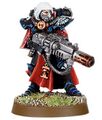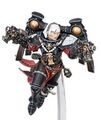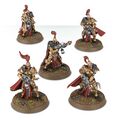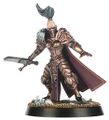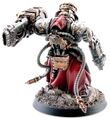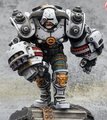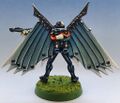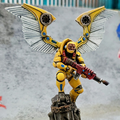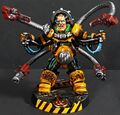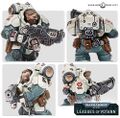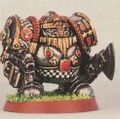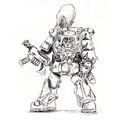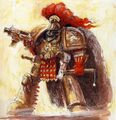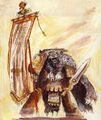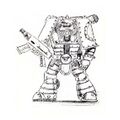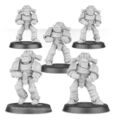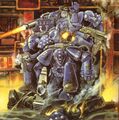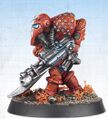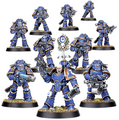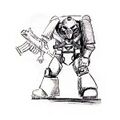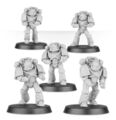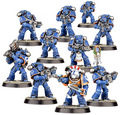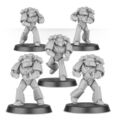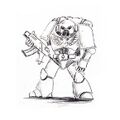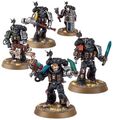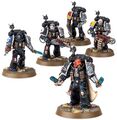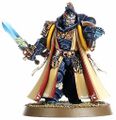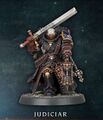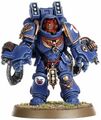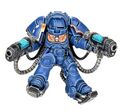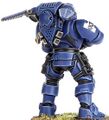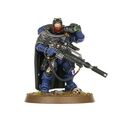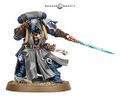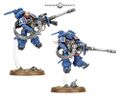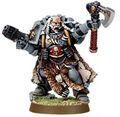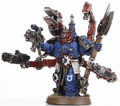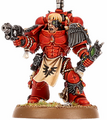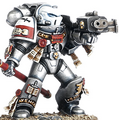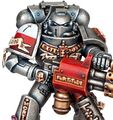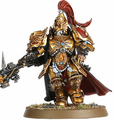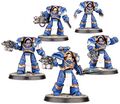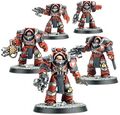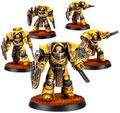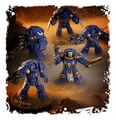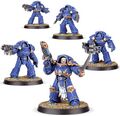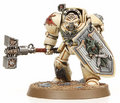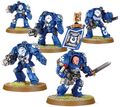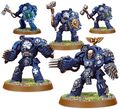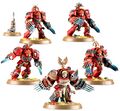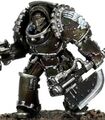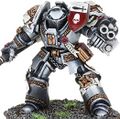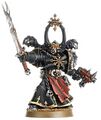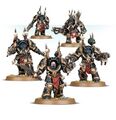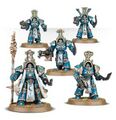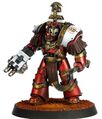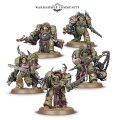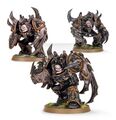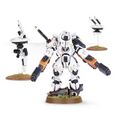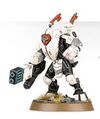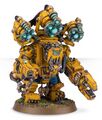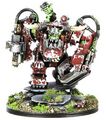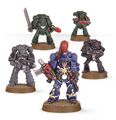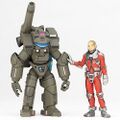Power Armour: Difference between revisions
1d4chan>Derpysaurus |
m (1 revision imported) |
(No difference)
| |
Revision as of 21:57, 18 June 2023

"Feels like you can take on the world in there, doesn't it?"
- – Danse, Fallout 4
Power Armour, also known as Power Armor to Americans, is a science fiction concept of mechanized armor which increases the strength, speed, and reflexes of those who wear it. It is featured heavily in science fiction/fantasy settings such as Iron Man or Warhammer 40,000. The idea of Powered Armor was invented by E.E. Smith and ripped off or borrowed and refined by other writers.
Before you add anything...READ THIS
Like Approved anime, /tg/ sure like their power armour. However, power armour is so ubiquitous with Sci-Fi that listing all of them would turn this page into a nightmare to navigate. So before you add your own section, ask yourselves this:
- Is it actually power armour? I mean, there are certain pieces of wargear that may look like power armour but actually isn't, at least not by definition. This gets trickier to identify and classify if your armour originates from a science-fantasy universe.
- Is it relevant to /tg/? And we don't mean is that power armour from Sci-Fi, no shit it is, what we meant is that does that power armour come from a well developed tabletop presence?
- Is it licensed from a traditional game? This ties back to the first point, it must also come from an official licensed IP, not some third-party source.
- Does it have any historical relevance? Does this power armour you listed offer any historical significance on its influence on the sci-fi genre and other forms of media?
If you do not think it fits in the article itself, add it to the relevant section of the article discussion page.
Starship Troopers
Like so many military science-fiction concepts, the modern idea of powered armor dates back to the Mobile Infantry of Heinlein's Starship Troopers. The "Marauder" suit is bulky, with integrated thrusters and heavy weapons (including nuclear weapons and heavy explosives, carried as easily as a human soldier carries grenades). Their primary purpose is not to destroy indiscriminately (though they certainly can), but to "make war as personal as a punch on the nose" -- to drop in and destroy with precision, in order to break the enemy in exactly the right way. In other words, it's much like Crisis battlesuits with less weeaboo and more humanity fuck yeah inside.
Heinlein never discusses pauldrons, but the Space Marines certainly take after the Mobile Infantry's other aspects.The dudes from the book not the movie. That was a parody anyway.
- Marauder: The basic infantry suit. Can carry more weapons than vintage Doomguy. Basic equipment includes radar and multi-spectrum vision aids.
- Scout: Lean on weapons, heavy on jump fuel. Much more mobile than the standard model.
- Command: Scout suit with more comm gear and gyros for inertial dead reckoning navigation. In practical terms each command suit is an instant, automatic, battlefield mapping system that can share its nav data with other command suits. This is the sort of battlefield data fusion tech DARPA wishes they could buy and have it actually work as advertised.
So how many weapons we looking at here? Well, in the first chapter of the book, Rico is participating in a quick raid on an alien city. Their objective was to smash and run, inflicting as much material damage as possible without the indiscriminate civilian casualties of strategic bombing. For this missions he dropped into battle with: a rifle, a heavy flamer, a handheld flamer, an automatic grenade launcher (called a Y-rack) and multiple reloads, conventional thrown grenades, incendiary micro grenades (called firepills), and one psy-ops grenade (a talking timebomb). And topping it off since Rico was a non-com working on the flank, he was issued a rocket launcher with four low-yield nuclear rockets.
Warhammer 40,000
Because 40k has a huge hard on for Space Marines, and because no super soldier worth his genetic enhancements will go into battle without super armaments, 40k has developed nearly as large a hard on for power armor.
Human Power Armour
Virtually identical to Space Marine power armor (More can be read below), these suits of armor are scaled down to fit regular humans (notice that this is the reverse of what it would have been 10,000 years ago). Human power armour is relatively quite rare, since it occurred to somebody that making good protection being an affordable and wide-spread asset would severely impinge on the current state of grimdark, not to mention expensive.
Without the extra room and black carapace interface Marine armor provides, many suits of human power armor don't offer the same degree of protection, as much strength enhancement, or as many subsystems found in Marine armor. Still, the wearer will still be stronger, better protected, and better equipped than the guy in cardboard. There are a few variants, including a lighter suit and one for Chaos-fighting Inquisitors. Because these things are still super-rare, usually only people rolling in money, tech fetishists, and those able to declare not giving them power armor is heresy, will have any.
Ignatus Pattern Armour
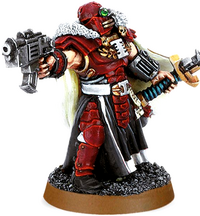
The most 'common' type of non-Astartes and non-Sororitas Power Armour.
The Ignatus pattern power armours are all fine examples of Mechanicus artisans. Each of them are individuality crafted only for representatives of the Inquisition. Of course not as durable as Adeptus Astartes power armours, the Ignatus-pattern is far better designed than those sold to nobles, rogue traders and other agents of the Imperium.
Like every other power armour variant, Ignatus armour is made of thick ceramite armour plates and incorporated electro-muscles so the user can even use the power armour in the first place. The optional helmet protects the wearer from toxic gasses, allows the wearer to breathe underwater, and even survive in a vacuum as long as the suit has power. The helmet has photo-visors so the user can see in the dark and an automatically closing visor renders blind-grenades useless against the wearer. They also have micro-beads and an integral auspex which can be controlled by speaking to the armour’s machine spirit, or the wearer could commune with his armour directly if they have a cerebral plug, MIU, or similar device. It is also possible to use a backpack for the suit which acts as an external power source. With this power-backpack, the wearer can use his armour for five continuous days in battle conditions.
Because the Inquisition often has to deal with Ruinous Powers and other heretical forces, Ignatus suits are commonly inlaid with hexagrammic wards.
-
Inquisitor -
Ordo Xenos -
Malleus Power Armour

A 'step up' from conventional Ignatus Pattern Armour. Malleus Power Armour are only issued by the boys with a daemon fetish, which makes them even more exclusive then normal.
As such, they are rare even among the Holy Ordos, as this power armour is inscribed with pentagrammatic wards in the vaults deep below the Tricorn Palace, which makes them the garage-sale equivalents of Aegis Power Armour.
It is highly prized by those who expect to fight daemons in hand-to-hand combat, and an Inquisitor who allows an Acolyte access to it must have good (or desperate) reasons. The wards inscribed onto the armour harm Daemonic creatures who directly strike the wearer. The wards are temporary at best, some failing after a single encounter, but servants of the Ordo Malleus regard them as the biggest spite attack they have, hoping that they will still be able to get the final middle finger and wound or slay those Warp pasties even if they themselves got mirked.
The power pack used in Ordo Malleus power armour allows it to operate for a week without recharging. Alternatively, it can be equipped with a power supply like that used by the Adeptus Astartes.
Malleus Power Armour also slightly differ in the sense that the chest piece, vambrace and leg armour is more pronounced and bulkier than typical Ignatus Pattern Armour, which is to obviously provide further protection from the Immataerium. Still no standard helmet though.
Delphis Mk.II: Ironclad
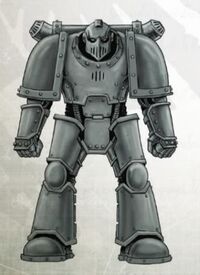
A power armour that looks like something an Astartes would wear.
The Delphis Mk.II "Ironclad" Heavy Power Armour is a variant of standard non-Astartes power armour. It features increased personal protection at the cost of agility, with huge plates of Plasteel covering the flatter areas of the body. Exposed servo-mechanisms run along the legs and arms and elaborate bracing runs across the spine.
The helmet is small by comparison and the gauntlets are unwieldy to the point where basic actions beyond wielding a weapon is impossible. The power cell system in the rear has several thermal fins protruding to shed away excess heat. Ranks of power cells mounted on the rear provide 12 hours of continuous operation before recharging is needed, but require a day of recharging after each prolonged use. Compared to the Ignatus Pattern Armour which can last for 5 days with a power backpack DLC or the more advanced Sisters of Battle and Astartes Power Armour which can run indefinitely due to its fusion process, the Ironclad's battery lifespan is comparably short-lived and inferior. But hey, this is probably the cheapest and most cost-effective power armour a regular Joe can get with enough money that still provides enough protection on par with a Mark VII Aquila Power Armour; so you get what you pay for. The suit is also a fully enclosed void suit and incorporates an inbuilt auspex, good craftsmanship photo-visors, an incorporated vox, and a pair of recoil gloves. If the suit becomes unpowered, vents open automatically in the helmet to ensure the wearer does not suffocate.
Each suit is a personal heirloom item, colourful paintwork and elaborate scrolls delineating the history of the various users cover the surface; some users have also added additional ornamental shields to indicate their personal heraldry. The more ostentatious suits may also include large retractable poles for flying more elaborate personal banners and their vessel’s blazons. As such, it is very popular amongst Rogue Traders who are expected to only interact with dangerous environments pretty briefly.
Because of all the layered protection, the Delphis Mk.II is the toughest and most 'powerful' of the non-Astartes power armours.
Sisters of Battle Armour

Less bulky than the Space Marine armour, as they're designed for normal sized humans. Despite Astartes & Sororitas armour both giving 3+ saves on the tabletops, in actuality the power armour of the Orders Militant of the Adepta Sororitas provides less ballistic protection than Space Marine armour does. (The identical in-game protection is mostly because saves in 40k are decided on numbers between 2-6, so there aren't as many gradients in-between.)
This armour also does not provide the same level of strength enhancement, but it gives enough to carry heavy bolters and ammunition into combat, and fire them without a sister shattering her arms. Sororitas armor has noticeably smaller pauldrons. The leading theory behind why they chose this design feature is that smaller pauldrons cut back the material cost it takes to create this variant, without having to sacrifice the pair of perky, globular breasts.
Helmets (Thereby known as Panty Helms, seriously, look at the damned thing) are not included as standard either, mostly because the majority of Sororitas models have spent hours doing their hair distinctive haircuts. But also because (according to Dark Heresy), the Sisters of Battle do not receive their helms until about halfway through their careers (how the sisters of battle are expected to fight in environments hostile to human life like space then is anyone's guess). This makes them inverse of the tradition held by the Astartes, where higher ranking officers are more likely to ditch their helmets instead. Said helmets is officially called the 'Sabbat' Pattern Sororitas Helm which comes with a comm-link and rebreather unit for limited operation in a total vacuum; the helmet includes full-spectrum filtering and psycho-oculal buffering to assist the (less physically durable) human mind from being rendered insensible by battlefield conditions.
Despite the strained relations, this type of power armour is often crafted by the AdMech forges of Mars, Sororitas Power Armour is relatively lighter than most suits, providing excellent protection and increased strength at a negligible loss to the user's mobility and agility thanks to plug ports that link the Sister's musculature directly to the enhanced fibre bundle network within their power armour.
The advantage of Sororitas power armour, though, when compared to other human-scales of power amour, is that it runs off of the same fusion reactor that Astartes armour does, and therefore can run indefinitely, rather than for a few hours at a time. Another advantage is that it is not as bulky so it does not turn the wearer into a big giant target either.
-
Dominion Battle Sister with half-mask.
-
Seraphim with power armour and jetpack.
-
What is seen cannot be unseen...
Vratine Armour
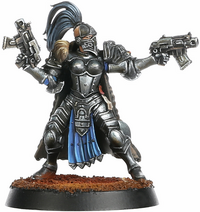
Exclusive to the Sisters of Silence, this is what the Null-ladies get to wear after finishing their training. The Vratine Armour is the armour of oath, containing designs akin to Space Marine Power Armour and possibly a local pattern of silicate-mesh from Luna (Selenite void-mail; Selene being a goddess of the Moon in Greek ROMAN GREEK mythology). Considering that the suit does not come environmentally-sealed like how Power Armour usually do (as you can see that the "helmet" is actually a full-faced mask) – though additional gear can be equipped to operate in a hostile environment – this armour that these Sisters wear is possibly the closest thing the Imperium has to the Mark I, which is also a Power Armour pattern that is not sealed.
On the other hand, the Sisters of Silence might have been a later addition to the Imperium over the course of the Great Crusade, and the design elements of the Astartes Power Armor is actually derived from a later pattern such as the standard Mark II, or maybe even up to Mark VI, assuming that the armour, like the Space Marines', has several renditions of itself. This is likely since the Vratine is designed with agility in mind, and the protection factor is also definitely not compromised for that.
Overall, the Armour provides formidable protection from ballistic impacts and directed energy weapons, and is tailored and forged uniquely to its intended wearer to allow for their complete freedom of movement and to augment their reaction speed.
As a side note, it doesn't have a noticeable reactor (much like Custodes armour) and is not called "power armour" anywhere in the FW books, but it is later identified as a form of power armour in the 8th Edition Sisters of Silence Codex.
-
Witchseekers in Vratine Armour without the helmet.
-
Vigilator with half-mask.
Dragon Scale Armour

Consider this a catch-all term for any variety of proprietary protection in a given Forge World’s standing army, e.g., Crimson or Praetor armor. Dragon scale armor is basically Mechanicum power armour, commonly used by militant Enginseers of Imperial Guard and Myrmidon warrior priests of the Ordo Secutor. It does not have an external power source, as it derives power from your not-so-standard-issue Mechanicus potentia coil (and therefore cannot be used by anyone outside the tech-priesthood or high-ranking Skitarii). As such, it is more accurate to call it an augmentation than true 'armour'.
Not as thick as Astartes power armour, it sports many more inbuilt devices and sensors and gets further pimped by the Techpriest wearing it as he progresses through the ranks of the Adeptus Mechanicus to the point where it's hard to tell where the armour ends and its wearer begins. It is in some ways, similar to Iron Man's armor, but more steampunk. Some wonder if it is connected to the Void Dragon.
Each set of dragon scale is individually hand-forged from adamantine and ceramite plating depending on how much the Adept likes his style, and are woven with prayers of permanence and micro-etched with fractal incantations of defence. In a sense, Dragon Scale Armour provides a higher form of customizability and versatility due to the wearer's vast and extensive augmentations.
So if the wearer wants to be more agile, thinner pieces are used to offer lighter weight whilst implementing stronger servo-muscles for quick bursts of speed; if he/she wants to be a walking tank then the opposite happens as they are bulked up in thicker plates whilst the muscles are reinforced to provide durability and strength.
-
Myrmidon Secutor -
Myrmidon Destroyer
Lorica Thallax
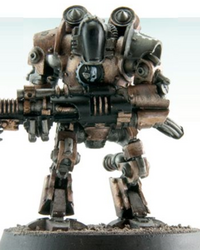
Less power armour and more servitor body. The Lorica Thallax is an even more extreme evolution to the already extensive Dragon Scale Armour.
The Lorica Thallax is a type of Power Armor worn by Thallax troops of the Ordo Reductor.
Divergent from their Astartes counterparts, it is permanently surgically bonded to the body of the wearer. So unlike the armour from an Astartes, the Lorica uses mechanical armatures to replace the primary limbs, and its protection only covers their organs, nervous systems, and cerebrum with the rest of the more 'useless' fleshy bits being long chopped away. The level of protection is at least on par with Astartes Power Armour, so we can deduce that ceramite is also used here.
Moreover, the armour system comes equipped with a compact reactor core to generate power for the Thallax's weaponry and the system can be equipped with a Jump Pack system. The armor is fused directly to the spinal cord and nervous system of the wearer, which marks them as a warrior of the Mechanicum and acts as a symbol of their eternal servitude.
As a interesting bit of trivia. The word Lorica is literally the latin translation of the word body armour. So Lorica Thallax is literally called Thallax body armour.
On the Horus Heresy tabletop, the Thallax armor grants them a 4+ save and FnP(6), but prevent them from Sweep Advancing.
-
Internal workings of the Armour
Hunting Rig
Ah yes, the infamous Hunting Rig from Necromunda. A bundle of such ridiculous bullshit, it is a miracle that the Adeptus Mechanicus did not lose their collective metallic heads the moment they lay sight on this DAoT-levels of ass fuckery. Used exclusively by the Spyrer rich kids, because of course they have Jeff Bezos-levels of money. Think of them as the Iron Man Mark 50 War Suit, motherfuckers can do damn near everything anything and makes most marks, variants and patterns of space marine power armor in comparison look like outdated children's play toys. Again, exactly how Necromunda avoided an entire AdMech crusade on their ass (as of yet), we have no idea.
Anyways, about that armour....it is self-sustaining, providing sustenance to the wearer so that they are not burdened by the requirement of food. It is also self-repairing, so that they do not require regular maintenance (Meaning that survival challenge can by done by finding a nice little hidey hole and holing up for a few days. Way to go, guys). However the most important feature of the hunting rig is their power boosting system. As the wearer fights and gains experience in combat, the hunting rig will adapt and evolve to suit the wearer by increasing power to certain systems, (essentially Leveling up) unlocking previously unavailable abilities and new potential as the hunt continues.
These suits are locked onto implants connected to the wearers central nervous system ensuring a seamlessly perfect fit, though make it practically impossible for someone else to wear the suit and even then they would have to have exactly the same body size and shape, so they are essentially useless as loot items or salvage.
Dark Heresy presents pieces of wargear built by the Jokaero for nobles in the Calixis sector, which are essentially the same as the ones found on Necromunda, these suits are scary as hell. Boosting the wearer's WS, Strength, Agility and Perception as well as granting a butt-ton of additional talents, turning the wearer into a 40k Ninja. However, the actual armour protection of the suit itself amounts to very little, so the user must rely on their enhanced reflexes to avoid injury or on some suits alternative defensive capabilities such as force fields or shields.
An alternate theory is that the hunting rigs are the creation of Tau battlesuit engineering. This is strongly supported in the Tau 3rd edition codex, which defines several words that are phonetically identical to the rig designations while being thematically accurate to the suit's functions:
- Orrus = Or'es (powerful)
- Jakara = J'karra (mirror)
- Malcadon = Mal'caor (spider)
- Yeld = Y'eldi (winged one)
Of course, considering the rigs are clearly much more advanced (such as freaking evolving), it is likely the nobles once upon a time illegally purchased Tau suits and hired hereteks to combine the knowledge gleaned with power armor to make something special and the names of the rig designations are due wanting to cover up the origins while also giving an arrogant finger to the law in plain sight. Or the rigs were inspired by Eldar Aspects and the ignorant nobles used Tau words due to being stupid/weeaboo.
Although each Hunting Rig is unique, they are designed to incorporate ritualised combinations of weaponry, so that groupings of hunting styles can be identified. But as the suits adapt to suit the wearer, even two suits that were similarly designed may be completely different by the end of the hunt.
Orrus Hunting Rig
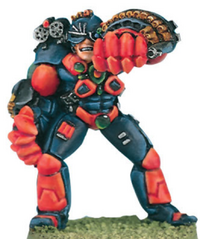
The Orrus is the most brutal but generic of the Spyre aspects. Specialising in brute force, they are characterised by oversized, piston-powered arms containing Bolt Launchers built into the fists.
They are also protected from shooting attacks by a force field generator incorporated into the warsuit. Orrus rigs typically evolve by increasing the caliber and firing rate of the Bolt Launchers or by increasing the effectiveness of their force field. How this is done, we are not too sure, although it might be due to the rig redirecting power towards both the weapon systems and force field systems.
Both of these scientifically unsound aspects sound suspiciously like the transforming abilities of Necrodermis...or something else. Of course, that’s true for all the rigs. Another edition for the Orrus is the fact that it comes with a helmet that has a sophisticated targeting cogitator that allows the wearer to literally look, point and shoot. Although, given how awfully inaccurate the Bolt Launchers are, the targeting system might as well be as good as useless.
Whilst not the toughest of the rigs, the Orrus definitely provides the wearer with sufficient protection. Overall, the most 'balance' and down-to-earth of the lot given the level of bullshit these rigs are capable of.
At its most basic, this suit increases the wearers WS, S & A by +1, provides a 4+ armour save and a 6+ invulnerable save.
The Bolt Launchers are functionally identical to Twin Linked boltguns, albeit with an 18" range.
-
-
-
-
Kevin Fowler's kick-ass modern rendition of the Orrus. Link to his credit.
Jakara Hunting Rig
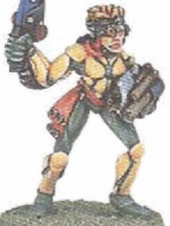
Jakara are the lightest but most agile of the Spyre hunters, specializing in speed and mobility at the expanse of overall protection.
It is note for being extremely feminine looking, which may be due to the fact that it is skintight bodysuit with some additional armoured padding for some glancing protection. Usually we only see female Spyrers wear these things because of...reasons. The armoured padding itself might be made of some sort of ballistic absorbent meta-materials to ensure both strength and flexibility in the process.
They are equipped with a Sword with a Monomolecular edge and a unique Mirror Shield which can absorb energy-based attacks and fire it back at their enemies. Jakara rigs evolve by increasing the mobility and speed of the wearer by increasing their leg performance, as well as the durability of their sword. It is most likely done through the redirection of power, applying and modifying the leg structure to provide better tensile acceleration upon the calf muscles with each step. This is to obviously compensate for the lack of overall protection of the rig, forcing the wearer to rely on speed and agility to evade attacks.
If speed isn't enough, obviously, the aforementioned Mirror Shield should help somewhat. However, as previously stated, the Mirror Shield is only effective against DEW, on projectile weaponry, it should provide as much protection as...well...an actual mirror, so even a musket would be enough to shatter it.
They also adapt by expanding the types of energy absorbed by their shield. And yes, they do look suspiciously similar to the Aspect Armour worn by the Howling Banshees. Way too similar.
-
-
-
-
-
Kevin Fowler's kick-ass modern rendition of the Jakara. Link to his credit.
Malcadon Hunting Rig

The most subtle and cunning of the Spyre groups. Basically 40k's spiderman for all intents and purposes.
They are armed like spiders, with Web Spinnerets designed to immobilise the enemy so they can be torn apart by their vicious claws. They are also equipped with climbing hooks and hydraulic pistons to allow the wearer to reach perfect ambush points. Their hands and feet are most likely embedded with millions of micro-hooks, allowing them to literally climb up walls if needed.
The Spinneret weapons can also be used to generate strands of web to further aid in climbing. These suits evolve by synthesising neurotoxins for application to their claws, or by increasing the range and area of their Spinnaret weapons. Their suit is further ribbed, probably to ensure that sound movement is minimised when LARPing as spiderman. Whilst nowhere near the capabilities of the Matriarch, the Malcadon still offers a good level of stealth operations.
What is most notable of this rig other than its weapons, is its helmet. The Malcadon possess the most complex and sophisticated helmet of the hunting rigs, sporting several different type of lenses that most likely have thermal, ultraviolet and night vision capabilities, alongside a potential zoom function. Given the fact that the Malcadon Spyrers are spies, such high levels of surveillance equipment incorporated into the helmet makes sense.
Like the Jakara, the Malcadon sacrifices defense for its peculiar abilities. And no, its name has nothing to do with Malcador
-
-
-
-
-
-
Kevin Fowler's kick-ass modern rendition of the Malcadon. Link to his credit.
Yeld Hunting Rig

Are the most peculiar Spyrers, being equipped with Chameleonic armour and razor-edged wings.
They are armed with multiple laser tubes built into their gauntlets called...well...Laser Gauntlets. Though their wings do allow them to fly, they make for better gliders. Their wings also incorporate the chameleonic technology which makes them difficult to track. Yeld can evolve by increasing the chameleonic response and the sharpness of their wing-blades, as well as by increasing the focus and fire-rate of their laser gauntlets.
In addition, in order to make flight even possible, the rig of the Yeld has adapted to become hollow, to ensure minimum additional weight for full flight. This of course, comes at the expanse of defense and protection, but, like the Jakara, the Yeld focuses on its speed and agility to avoid getting hit in the first place.
A starting Yeld gains +1 to BS (and movement, but this has no bearing in "modern" rulesets) as well as a 5+ armour save.
Their Laser Gauntlets start out identical to a pair of laspistols, but with a 20" range. (the original rules have them as identical to short ranged lasguns, but held as pistols; laspistols had considerably different accuracies).
Their wings give them the "Jet Infantry" type as well as inflicting a -1 on to-hit rolls when weapons fire at them from over half range.
-
-
-
-
Kevin Fowler's kick-ass modern rendition of the Yeld. Link to his credit.
Patriarch Hunting Rig

This armour offers the best protection of all the Spyrer armours, and it is only worn by those who have already proven themselves and cannot evolve further. For all intents and purposes, the closes we are gonna get to Human Terminator Armour. Fuckers even look like baby Failbaddons.
It is equipped with four Mechadendrite arms; two wielding power claws and two with pulse lasers that can track and target multiple opponents simultaneously due to the advanced sensor arrays built into the rig. The extra arms is controlled via the multiple cerebral connection cables attached to the wearer's head, like a mini-Perturabo.
How much protection it gives to the wearer, we are not too sure. Although some speculate that it is on par with that of modern Space Marine Power Armour or at the very least, the Delphis Mk.II Ironclad. The addition of its various mechanical tentacles makes the Patriarch Hunting Rig very lethal in close combat, although its lack of sufficient ranged weapons makes it poor in the opposite direction.
Despite its high protection capabilities, for some fucktarded reason, there never seem to be a helmet attached to it, making the entire point of the Patriarch, absolutely useless.
As its name implies, it seems that only men can wear these things. Whether it is due to tradition or model limitation is up in the air.
Matriarch Hunting Rig

The Callidus of Hunting Rigs that behaves a lot like the Crysis Suit from Crysis.
Designed for quietly stalking opponents from the shadows and slaying them up close, equipped with a camo-cloak to hide their position and mask their movements so that they cannot be tracked either at range or in melee. How it is meant to work, in theory is that the wearer would cover herself in the cloak fully which then turns her nearly invisible, like the invisibility cloak from Harry Potter.
Moreover, the skull-like helmet offers both good head protection and gives the wearer high-quality vision that may incorporate thermal and night vision, alongside an advanced cogitator that assists the wearer to identify which target to destroy.
They expertly dual-wield a large chainscythe and a monomolecular blade. Their armour offers the highest levels of speed and mobility short of the Jakara at the expanse of it being unable to evolve any further. Despite this sounding pretty awesome, their actual model looks like a crazy lady wearing a corset....with her cleavage for all to see. Also, its long ass dress and cape makes running in this thing, colossal pain in the ass. Moreover, the whole aspect of stealth is kind of rendered moot when you have a fucking Chainscythe at full rev. Yeah, it is not the most sensibly designed so don't expect much protection for this one.
As its name implies, it seems that only women can wear these things like the Jakara. Whether it is due to tradition or model limitation is up in the air. But whatever is the case, the Matriarch still looks the dumbest of the hunting rigs.
Squat Power Armour
Void Power Armour
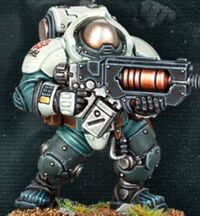
Our SPEHSS DORFS too, have their own power armour.
Not to be confused with the similarly named Void Armour and Reinforced Void Armour which are Imperial Carapace Armour, the Void Power Armour is the standard-issue armour for the Leagues of Votann. Yes, you heard that right, standard-issue.
Originally constructed for the most extreme of mining operations so that the Kin could Rock and Stone to the Bone, they have found use in warfare due to its immense protection against CBRN (Chemical, Biological, Radiological and Nuclear) weapons, thanks in part to it being comprised of hardened, jointed segments that are hooked into the void suit which in itself is fashioned from Magnaferrite weave, and often reinforced with Adamantine and enhanced with micro-field generators. This, when translated to tabletop means that yes, your most basic League troop may have a chance in outright ignoring Nurgle's Rot. Likewise, their Armor also stops any re-rolls for wounds or damage and reduces AP by 1. So yeah...
On another note, the armour looks like 1950s retrofuturistic spacesuits ripped straight out of Popular Science which makes it unfathomably based. Although some have accused it of looking too much like the Terran Marines ironically.
Brôkhyr Exo-Frame

When the Brôkhyr goes to war and become the Brôkhyr Thunderkyn, all of them must wear a specialized Exo-Frame in order for them to properly lug around their heavy equipment and weaponry with convenience. This advanced engineering equipment also helps out, with Omni-visors able to pick out the telltale signs of enemy units through the dense terrain.
The powerful suits they wear are adapted from rugged engineering rigs and allow the Brôkhyr Thunderkyn to heft the heaviest man-portable weapons the Leagues can muster with ease. More of an exo-skeleton than an actual plate of armour, the Exo-Frame resembles somewhat like the Power Loader from Aliens or the Sisters of Battle Paragon Warsuit, only less....retarded.
Seriously though, the Exo-Frame is what both the Warsuit and the Dreadknight should have been: small, compact, practical, not overly designed and does not get in the way of joint placement issues.
Exo-Armour
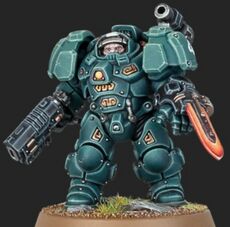
The humorously egg-shaped Exo-Armour is a type of heavy armour, comparable to Terminator Armour, used by the Squats. It is built by the Squat Engineers Guild. The extensive protection it provides is especially useful when fighting in confined spaces where movement is restricted and it is difficult to avoid concentrated enemy fire. Exo-armour is thus greatly valued by Squats, who often find themselves in combat in subterranean tunnels.
Exo-armour also serves as an all-enclosing hostile environment suit. The development of Exo-armour was spurred by the inhospitable nature common to the Squat homeworlds.
Exo-armour incorporates an integrated power axe and boltgun. Squat armourers are adept at forging magnificent exo armour, embellished with the visage of a Squat Ancestor Spirit. The armour is handed down from father to son and is probably the proudest symbols of status of the Squat military aristocracy.
The standard weapons fitted into suits of exo-armour are often upgraded to heavy or combi-weapons by wealthy Squat warriors. They are almost exclusively worn by the elite Hearthguards, although wealthy or prominent Squats such as Warlords and Living Ancestors are known to wear one too.
Recently with the return of the space dorfs as the Leagues of Votann in the 9th edition of game the Exo-armor has made a comeback. Now the elites who wear it are called the Einhyr Hearthguard. The new version of Exo-armor comes equipped with a Volkanite Disintegrator, EtaCarn Plasma Gun, and a shoulder-mounted Exo-Armour Grenade Launcher as well as Concussion Gauntlets for melee combat, with many more choosing to add a Plasma Blade Gauntlet or Concussion Hammers for better enhanced close quarters combat. The armour is made from ultra-dense materials attached to a complex servo-assisted frame, allowing the wearer to shrug off anti-tank weaponry while retaining full freedom of movement and even auto-stabilising their aim while they return fire. Their armor also has built-in microgravity field generators linked to implants via the HunTR targeting system to help keep their aim steady allowing them to fire on the move, as well as being equipped with Teleportation Crests to zap around the battlefield with ease in contrast to their Terminator brethren.
-
All aboard the Walking Easter Egg with Guns.
-
-
Vartijan Exo-Driller Armour
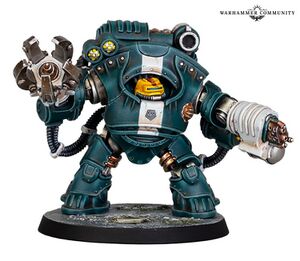
For the actual unit itself, see here: Vartijan Exo-Driller
A heavily modified variant of the regular Exo-Armour, the Vartijan Exo-Driller Armour is so god damned bulky that it is just one cogwheel away from being classified into a miniature walker like the Paragon Warsuit.
Widely-used by Necromunda's Ironhead Squat Prospectors. It is unknown if this power armour is unique to only the Squats from Necromunda or other Leagues also has access to these pieces of equipment. Whatever is the case, Vartijan Exo-Driller (Which was named after the legendary engineer Valya Vartijan), like all Exo-Armour, was designed to protect Squat miners in the most hostile of environments. They are armed with a piston-powered pulverising fist and a seismic crusher. Over the centuries, the Ironhead Prospectors of Necromunda have also upgraded their Vartijans with heavier weapons and better defences to protect them in the Hive World's hostile Ash Wastes. These include a Heavy Flamer – which can also be replaced with a Heavy Bolter. Armed with the Vartijans, the Ironheads can fight off hostiles who attack them or use them to claim prime dig sites in the Ash Wastes.
Slabs of plating are attached onto its massive mechanical form, making its sheer bulk enough to turn aside all but the most dangerous of weapons. The armour also carries comprehensive suites of sensor equipment, able to detect valuable seams of ore and hostile gangs alike.
Space Marine Power Armour
The most iconic users of power armour in 40k are the Space Marines and the Chaos Space Marines. Made of ceramite layers upon plates of plasteel and adamantium/adamantite which will deflect all but the most powerful of weapons, Power Armour possess many life support systems designed to keep the Space Marine inside alive, even in the worst and most extreme of battlefield conditions. Has physical properties that has led some material scientists (who clearly also do Warhammer) to speculate whether Space Marine armour is in fact an extraordinarily tough ceramic compound (ignoring all this easily trademarkable sci-fi bullshit about plasteel and adamantium/tite), which would make sense given that the Emperor actually invented very little new stuff when making the Marines' battle gear, instead just scaling up and making it bigger/louder/harder/better/faster/stronger etc.
The Black Carapace, one of the Gene-Seed organs, is specially designed to allow a space marine to interface his nervous system with his armour and is the last organ implanted in Codex Chapters. Amongst its features, power armour possess auto-senses to supplement the Marine's already considerable senses, auspex arrays to create minimaps and transmit data between squad members and commanders, painkiller delivery systems in the event of severe bodily damage, and waste recyclers to keep the Marine going for up to fifty days without fresh food or water. Or, for that matter, taking a shit. The connection between the two being one of the rather less dignified aspects of Astartesdom. The power source is a backpack mounted generator which needs initializing, but after that can take solar energy to keep itself going. According to GW, the backpacks themselves were inspired by the bedrolls (actually greatcoats in reality) carried by soldiers in the Napoleonic era. The "roll" on the backpack contains oxygen for use whenever the environment demands (like space combat) and the balls on the sides are either jet engines for manoeuvring in space or heat vents. Some early art showed they are more likely jet engines, and can lift a Space Marine for extra battlefield maneuverability, though presumably nowhere near as good as a Jump Pack. Running throughout the suit is a notoriously wilful machine spirit that maintains the armour and assists with the interfaces.
There are eight ten (technically nine because one has never been shown) types or Marks of Power Armour used by the Astartes. Regardless of their type, they all have massive Pauldrons, under which the Marine's ammunition is stored. Pictures can be found in the gallery at the bottom of the page.
Mark I: Thunder Armour

The first type of Power Armour was designed for the Thunder Warriors and worn by many of the techno-barbarians of Terra. They provided basic protection against weapons and enhancements to upper-body strength, but that is all - the suit was incapable of supporting its own weight and basic variant did not provide any significant protection to the legs. Which seems like a bizarre and terrible idea given that as any person who moves furniture often can tell you; you should do most of your lifting with your legs unless you want to give yourself a hernia, and as most soldiers can tell you, having to carry a lot of extra gear with the weight distributed onto your shoulders sucks and is exhausting, and being fatigued significantly hurts combat effectiveness. But perhaps this was intentional as the Emperor intended to replace the Thunder Warriors anyway. Since they were only used on Terra, there was no need to protect them against the void. Though the lack of life support systems and much lesser degree of protection make them essentially useless in the 41st millennium (this doesn't seem to stop people from pestering Forge World to make models for it though, even though they've said that they won't for exactly this reason), several Chapters retain sets of Thunder Armour for ceremonial purposes. If you were to field one now, it would probably count as carapace armour (4+ save) with a slight bonus to strength but a penalty to initiative.
In Deathwatch, you can actually get your hands on some. Be forewarned: it's noisy, doesn't offer as much protection, doesn't work with a Marine's Black Carapace, and actually might not be a whole suit of armour depending on its state of (dis)repair. Overall, it's kind of shitty, but it's a surviving artifact linked to the days of the living Emperor and early Imperium, and that impresses other Marines and those Ecclesiarchy schlubs. Take it for formal occasions.
Mark II: Crusade Armour
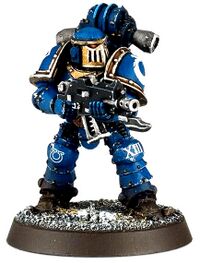
Designed by the Adeptus Mechanicus with the Great Crusade in mind, the Mark II armour was fully enclosed and contained all the life support and auxiliary systems that would become standard issue for later marks of Astartes power armour, like a waste recycling unit and automated medical equipment. These additions were made possible by a more efficient cooling system, which allowed a considerable reduction in the size of the armour's power pack. For example, the chest coils, which were kept on the outside of the armour on Thunder Armour for cooling purposes, have now been placed on the inside of the chest plates thanks to more efficient cooling mechanisms. However, this design could not be copied over to the new powered leg armour, which resulted in exposed cabling on the backs of the lower legs.
The helmet also came with a bunch of enhanced sensory equipment, enabling the wearer to see in the infrared and ultraviolet spectrums. Images could be zoomed in and magnified while sounds could be enhanced. Overall, protection and flexibility was much improved, especially since the legs were now enclosed in armoured hoops and came with their own servomotor, although with the caveat that the overlapping hooped armour plates were difficult to repair. Unlike the Mark I suit, the design is still sufficiently sound to remain in active, albeit extremely limited, use well into the 41st Millennium.
Early depictions of this armour often featured a fixed helmet, similar to old-school diving suits. While Forge World completely retconned this away for the sake of compatibility with other Marine kits, there had been depictions of Mark II suits with movable helmets since the Rogue Trader days, so it's not like GW were ever consistent about it anyway.
-
-
Older version of the armour
-
-
The armour that carried out the Great Crusade
The Lost Mark: Imperial Armour
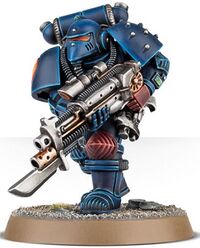
This interesting mark of old and exceptionally rare armour had the mother of all retcons since the rewriting of the god-awful Khornate Knights. According to White Dwarf 469, this is a lost mark of power armour, dubbed the 'Imperial Pattern'. No, this isn't the Corvus Armour you're looking for; the power armour timeline in the HH2.0 rulebook states that the 'Imperial Pattern' was manufactured between the Mark II and Mark III patterns. Instead, it's a completely different thing all together.
This lost pattern carried with it multiple design idiosyncrasies, such as a helmet that came before the Beakie one but wasn't a Beakie helmet, a "distinctly archaic arrangement of vents and joints", and a lack of the flared greaves seen on the rest of the Space Marines' power armour marks. Moreover, in these sources, the wearers of this class of power armour also bear a singular weapon thought to be related to the almost obsolete volkite, some manner of disintegration beamer and sidearm. Now whether Marines issued this armour automatically came equipped with these weapons like a combo package is unknown. Given how rare these things are in the fluff, it wouldn't be surprising if only a handful still exist within the wider Imperium.
In case you haven't figured it out yet, the 'Imperial Pattern' is actually the mark featured on the very first Space Marine model ever released way back in 1986. GW even updated the model for 40K's 30th anniversary, which you can see on the right.
Now why GeeDubs wanted to retcon what was once the Beakie armour from Rogue Trader into something completely different, we have no idea. Good thing it doesn't detract from how fucking dope the armour is.
-
As it appeared in first edition -
LE2 Imperial Space Marine, 1986
Mark III: Iron Armour
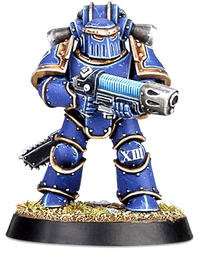
Mark III Armour was first conceived for the Squat campaigns and boarding actions of the Great Crusade. The pattern was a modified Mark II designed to provide better frontal protection for close-quarters combat, essentially fulfilling the role of Terminator armour before that was invented. It should be noted that the Mark III was never intended to replace the Crusade pattern, but to act as an optional suit specialized for the above-aforementioned situations. Because of this, no Legion was ever fully equipped with the Mark III. While successful in the conditions it was designed for, it was too clumsy and uncomfortable for conventional fighting.
By the time of the Horus Heresy, the Mark III was slowly being phased out and replaced by various patterns of Terminator armour, but it's still fairly common among the Traitor Legions. In fact, several of the more traditional Legions were reluctant to phase out Mark III because it was the most brutally iconic mark of power armour in their day, so there was talk of keeping it for honor guards or spear tip operations.
Of course, since it was good enough that it did Terminator Armour's job well enough to become "iconic" despite the Mark II being the primary issue at the time, then maybe they should've kept using it to augment Terminator forces when numbers were needed. Even into M41, the helmet or faceplate is still popular. It appears as a DLC Armour in The Last Stand for the Space Marine Captain, where it increases the force of his melee strikes.
-
-
-
-
Heresy era Emperor's Children legionnaire -
Ultramarines
Mark IV: Maximus Armour
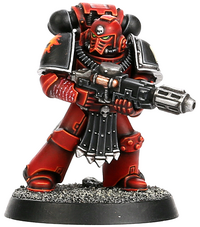
After a few decades of crusading, the Mechanicum was able to further refine the power armour's internal systems thanks to having access to more Standard Template Constructs recovered during the course of the Crusade. In addition to having more advanced visual sensors, the helmet was now capable of easier movement. The suit was also made much lighter than before while only marginally reducing protective capabilities compared to the Mark II. It was much easier to manufacture compared to the MkII and was also easier to repair thanks to the lack of interlocking armour plates and whatnot. This statement rings true as in the Horus Heresy tabletop, nearly every single elite or special unit of the various legions wore these things like a Russian gopnik in Adidas tracksuits. Fuckers were everywhere.
Although the chest power cables were once again relocated to the outside of the plating, they were given an armoured sheath to protect them from damage (since the gaps between armour are actually made of plasteel, that was likely used on the cables, as plasteel gives Terminator armour its legendary durability). Horus Lupercal manipulated the Mechanicum's supply lines to ensure that the Legions that were planning to side with him in the Heresy would be fully equipped with Maximus Armour in time for the Heresy; as a result of this, Mark IV was usually reserved for Chapter Masters and senior captains in the Loyalist Legions. As the Legions were either fully or partially re-equipped with these suits by the time the Horus Heresy began, Mark IV remains one of the most prevalent types of armour among the Chaos Space Marines.
It's a little strange that the Imperium didn't build more of them after the Horus Heresy, though, since it's far easier to produce and repair than the current Mark VII but not notably inferior. Seeing as they're always short on everything, you'd think these features would be the most important thing to consider for them (Apparently the Red Scorpions and Iron Hands are the only loyal chapters who still know how to produce them, and presumably won't share the STC for the same reason the Blood Angels won't tell people how to put Librarians into Dreadnoughts).
Some Chapters/Legions also made their own sub-patterns of Maximus power armour, such as the Ultramarines' Praetor pattern and the Thousand Sons' Achean pattern.
-
-
-
-
As a relic of the Angels Revenant chapter -
Tactical Squad
Mark V: Heresy Armour

In between production of the Mark IV and what would be the Mark VI, both Loyalist and Traitor Legions found that they were running out of replacement parts for damaged systems. This would result in several Legions taking parts from older Marks and inadvertently making a brand new Mark of Power Armour. Although appearances varied widely as a result of its ad hoc nature, some form of standardization was achieved. One of the most notable was the introduction of molecular bonding studs on the left pauldron and both greaves (the famous "rivets"), which made them look totally Metal - these were actually originally designed to field-patch busted vehicle armour before they could be repaired properly. Probably one of the most common suits of armour in service among the Traitor Legions, since this was what most of them were wearing when they retreated to the Eye of Terror.
For a while, the Horus Heresy novels and black books outright retconned Mark V armour into a catch-all term for any improvised or prototype suits that existed outside of the main Mark series, yet weren't advanced enough to be considered artificer armour (likely so Forge World wouldn't get nagged to make variants of all their Mark III and IV squads in Mark V as well). However, they ended up backpedalling on this a bit in Retribution. The classic "studs and cables" version shown here is now apparently considered the "production" model of Mark V armour (apparently based on common designs for parts known to have specific cross-compatibilities, often based on prototypes circulating among the Legions for testing purposes), while the more variable, improvised suits it was based on are "non-production" models. Presumably, Forge World realized that the retcon didn't make much sense, since all known art and models of the armour up to that point were no less visually consistent than any of the other Marks (and arguably more consistent than a couple of them). According to the new Horus Heresy red books, its most common form combined elements of Mark IV and Mark VI armor in a manner that could be locally manufactured (or otherwise obtained from existing stocks) and could be maintained even with supply lines destroyed.
-
-
-
-
The Carcharodons' favourite armour pattern
Mark VI: Corvus Armour
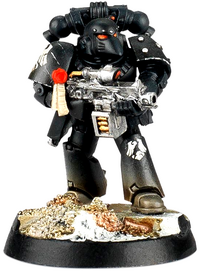
The much-beloved Beakie armour. Designed during the latter years of the Great Crusade, the Mark VI was initially field-tested by the Salamanders and Iron Warriors, with the intention of making it the proper Mark V. While the former's reaction is unknown, Perturabo despised the idea of reducing the protection of his cannon fodder sons cannon fodder. He arranged for the next test to be conducted by the Raven Guard, and so Corax, whose tactics Perturabo despised, received a shitload of factory-fresh beakie battleplate and was sent out to the galactic fringe to fight Eldar. Much to the Iron Lord's surprise, the test was such a smashing success that the suit received the XIXth Primarch's name, and the beakie armour became a common sight in his legion even before it was actually accepted for service in the wider Imperium. It anticipated some of the features of the Mark VII, producing a suit of armour that is in many ways equal to its descendants, if a little bit specialized. By the time of the Siege of Terra, it had entered mass production on both sides (Horus had captured several Forge Worlds responsible for manufacturing it at that point), with the Emperor's Children coming to favor its use as well.
Although it offered the worst protection compared to all other proper marks, the Mark VI armour was the first to feature a redundant power system and parts that are largely interchangeable with those of other marks, particularly with Mark VII. It also manages to be lighter and fit together more smoothly than the current Mark VII Aquila due to its slightly lighter armour, allowing for quieter movement, while the helmet includes further improved sensor systems in its, um, "beak". Due to the design's inherent stealthiness and legacy, it still remains the favorite pattern for the sons of Corax, who tend to be saddled with older equipment anyhow. For reasons nobody can seem to explain, it was also sporadically used by the Alpha Legion early on in the Horus Heresy even though it was never actually issued to them. Then again, it's the Alpha Legion so who knows.
RETCON TIME! As of Horus Heresy 2nd Edition, every Legion has them and it's the most common armour mark for the cannon fodders created during the Heresy. All of this lore-rape to try and cash in on Beakie nostalgia while also selling their subpar plastic Mark VI kit instead of doing plastic Mark II. (You still bought them though, didn't you?) This new Beakie kit actually contains the "RTb01 Sub-mark" (real fucking subtle GW), which is visually different from the standard Mark VI pattern, looking more like the old school Beakie models, and while a fluff reason hasn't been given why this mark was so wide spread through the Heresy and then all but disappeared by 40k, the running theory is that this Sub-mark was cheaper and quicker to produce, while probably being a bit cruder than the standard Mark VI pattern and so was phased out after the Horus Heresy was over and more of the standard Mark VI could be produced (of which only the Raven Guard and Alpha Legion had in any significant numbers during the Heresy). Does it fix the lore rape and lack of plastic Mark II? No, but it does slightly sooth the burning sensation.
-
-
-
-
A White Scars legion tactical marine -
One of the new RTb01 Mark VI models, here to fuck up the lore and stab you in the ass.
Mark VII: Aquila/Imperator Armour

You know'em, you love'em. The most iconic Power Armor design in the franchise and also the pattern that has been in production the longest. Whilst other older Marks (With the exception of the beakie armour) was eventually phased out over the course of the Great Crusade and the Horus Heresy, the Mark VII has chugged along for 10,000 years because the AdMech hit a Derp and couldn't be assed to make anything new until the return of Papa Smurf. Those lazy fucks. (Or more realistically, the Mechanicus didn't see a good reason to replace the Mark VII, which was already pretty good as is. Extensive R&D, re-tooling entire Forge Worlds to meet new demand, and retrofitting existing suits with new parts isn't cheap, and that's on top of their 'Innovation is the Devil!' dogma.)
The most common Mark of Power Armour among loyalist Space Marines, Mark VII armour was still being designed when the Traitor Legions reached the Sol System and seized Mars. When this fact became all too foreseeable, Rogal Dorn ordered the design teams transferred to Terra to prevent the Traitors from seizing it. The Mark VII featured completely covered chest and arm cabling, a distinct helmet that provided more protection, a high level of compatibility with previous marks, and also bore the Imperial aquila on the chest, which was first used there to provide quick identification of the Loyalist Marines during the chaos of the Siege of Terra.
Moreover, this pattern abandoned the studded shoulder armour plate and replaced the helmet. As Mark VII is a development of Mark VI, both have a great deal in common, and parts from one are readily interchangeable with parts from the other, like the helmet. According to GeeDubs, the design of the helmet was meant to resemble a human skull, but you must be drunk from Mjod in order to see that resemblance. The Mark VII also contains its own back-up power supply and a solar array to recharge, so the suit can operate even without its backpack, though only for a short time.
-
-
-
The most iconic pattern
Mark VIII: Errant Armour

Jes Goodwin originally designed it with awesome Power Fist-style hands, a modified helmet, a streamlined power pack, and a more flexible leg-and-ankle joint. Games Workshop only bothered with using the altered breastplate, so the overall design looks like a regular Mark VII with a collar. That said, the more recent models for Space Marine Devastators have a flexible, ball-like ankle joint more in line with the original artwork. Deathwatch models have this ball-joint and the modified helmet, and Primaris models also have this ankle joint, presumably inspired by the Mk VIII like the breastplate collar is. Said collar is described as being brought into use due to an alarming pattern being noticed; namely, that bullets would deflect off the top of the breastplate and up into the bottom of the Marine's helmet, killing him, or would pass in-between the bottom of the helmet and the top of the chest plate, into the Marine's throat, killing him. This is similar to a problem found on the gun mantlet of the German Panther in WWII, in which the rounded mantlet would send shells straight into the hull roof. Later Panther G models would have a "chin" to prevent this.
This was only really a problem with bolt shells due to plasteel armour protecting joints. But, when most of your enemies use bolts of some size or you're fighting Traitor Marines, this is really damn bad. Breaking the trend of reverse-compatibility between newer and older patterns, the Errant pattern can only accommodate the helmet designed for it, which kind of becomes a moot point when reserving it for officers, since everyone higher up than a Battle-Brother will never wear his helmet. The specialist design, or the Adeptus Mechanicus's head-up-own-arse tendencies around distributing new technology are thought to be the probable reasons why it has yet to be widely adopted among Space Marine chapters. Because of its rarity, the armour is generally restricted for use by senior officers only, and even then they'll usually only be able to wear the breastplate. The Munitorum series from GW, however, shows that it's fully compatible with Mark VII, so veteran Marines will sometimes receive a piece of Mark VIII to replace a part of their Mark VII suit for some heroic deed. This means that if you see a Marine equipped with full Errant pattern, he is a serious badass and likely expects promotion. The Minotaurs and Deathwatch chapters appear to be the exceptions here, as almost all of their Battle-Brothers have access to full suits, the former because they suck the High Lords' dicks and the latter because the Deathwatch is a special operations group made up of veterans of all chapters.
It should be noted that, while artificer armour (at least in the art) looks like a pimped out Mark VIII, regular Mk.VIII doesn't actually improve armour save. But Fantasy Flight gave it some love with an extra armour point all around, and the ability to deflect some headshots to the chest, greatly improving its protection and explained why so many officers using it tend to not wear a helmet (not to mention that the collar helps protect the neck from shrapnel or shots hitting it).
-
-
The Errant Armour comes as a standard...
-
in the Deathwatch, apparently...
-
The most complete depiction in official artwork to date
Mark IX Armour
Suffered the same fate as Windows 9. Who knows, really. This mark was skipped over when Mk10 was introduced, and no details were made available. It could either be a Mark V treatment, with any Mark VII or VIII suits made with improvised parts or even contemporary Artificer Armour counted as the Mark IX. Another possibility is that the Mark IX might be part of Guilliman's new job of actually getting stuff done by rolling out a new mark for the Classic Marines. Nothing's really known at this point, and there's still no word over five years after Primaris were first announced. Why GW doesn't make a new set of models and state that this Mark is used to bring the Firstborn Marines' physical capabilities to Primaris level is a mystery for the ages. Then again, it could just be that Mark X sounds way cooler than Mark IX (iPhone X and Windows 10, anyone?), although Geedubs did allude to its existence when Primaris armour was revealed to be numbered as 10.
If it helps, it has been suggested in forums and such that Mark 9 power armour was the 'variant' used by pre-Primaris Librarians. Still, it is annoying that nothing official is there to be found. This could, of course, be nothing more than wishful thinking or plain old nonsense, as Librarians have been shown in various armour patterns and some sources have shown their psychic hoods as a detachable add-ons rather than built-in.
Or maybe somebody forgot it only went up to Mark VIII when they were designing the Primaris Marines.
Mark X: Armour System
A new form of Power Armor introduced in 8th Edition, worn by the Primaris Space Marines. Unlike all previous marks, the Mark X was built with internal modularity in mind, and all their pieces can be swapped, allowing single set of armour to be used for multiple battlefield roles. If the next mission is more stealth oriented, you just need to swap in the Phobos package; if you're going to take heat, change the suit into a Gravis. It's basically kitbashing on an armour level. But this also allows you to create your own armour configurations.
There are several configurations that are currently in use:
Tacticus
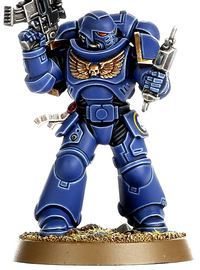
The "default" form of the Mark X, the Tacticus configuration combines aspects of previous armour patterns, such as the Mark VIII collar and the Mark IV helmet, and all the latest technology of the Imperium in the 42nd Millennium. (Still doesn't affect armour save.)
So far it's only been shown on the Primaris Space Marines, it is unknown if the scruffy old obsolete Space Marines will get it. The vambraces are noted to have built-in cogitator systems, which can be used for a variety of purposes depending on the user's role, whereas the knee plates have a raised flange guard to protect the joints. Other improvements include the Pauldrons which now incorporate a second armour layer, reactive armour and curvature which increases the armour's protection potential as well as a reinforced undersuit. Moreover, the armour also has socket ports for stim-injectors and diagnostic data-links, which makes the life of an Apothecary a whole load more easier.
The backpack now has reinforced armour plates which offer better protection to the vulnerable fusion reactor. Like the rest of the Mark X suite, the Tacticus pattern is highly customizable; for example, the librarian has a Gravis style plated belly. Other changes can be seen across the range, such as the form-fitting greaves on the Chaplain and the occasional addition of tassets to the hips (especially common on Hellblasters).
Due to the modular system of ceramite plating, maintenance cost is actually higher than it is for the older patterns of Power Armour. That and it's bigger too, which means more material cost on average (Although the high customization actually cheapens the overall cost of a Chapter's armoury due to the increased standardisation).
-
Primaris Apothecary -
Primaris Chaplain -
Primaris Librarian -
Judiciar
Gravis

The heavy configuration, the equivalent of Terminator Armour that grants +1 Toughness and +1 Wound as well as more mobility and flexibility. Yay. (Rumours that 8th Edition was being designed to make future vidya gaem projects easier to code remain unfounded.)
Gravis armour is worn by the Captain included in the Warhammer 8th Edition Boxed Set. The example captain had both a master crafted power sword (that does two wounds nowadays) AND a brand new Boltstorm Gauntlet which combines the functionality of a power fist with a bolt pistol capable of firing at triple rate -- Marneus Calgar approves. Said armour design appears to take some leanings from... Iron Man (a noted early proponent for the founding of the Mechanicus, as such a most blessed servant of the Omnissiah), or perhaps the T'a *BLAM* HERESY!, or Terminators, with what appears to be augments on the legs, an enhanced ribcage, and an enclosed armoured hoodie for good measure.
Gravis Armour (like all Mk. X) is highly variable; for example the Inceptors have a Tacticus-style bodyplate and a retractable face-shield.
Gravis Armour is also worn by the Inceptor Squads, granting them the toughness boost as well. Their version also comes with built-in jump packs, replacing the normal backpack-worn type, and shutter style face visors. Another variant is worn by Aggressor Squads, which can come with Fragstorm Grenade Launchers.
Models in Gravis Armour are fucking big even compared to even the NuMarines, so... Primaris Centurion Armor.
Seems to be the most contentious of all the Mark X variants, by far. It really seems like you either love or hate this one.
-
Primaris Aggressor -
Primaris Inceptor
Phobos

Another Mark X configuration worn by Reivers, Vanguard Lieutenants (and other Vanguard HQs), Incursors, Infiltrators and Eliminators Primaris forces, the Phobos can be compared to the Mark VI Corvus Armour due to similar associations with recon troops.
Like the Mark VI, the armour is designed for silent infiltrations and drop assaults – and by "drop," it is sneakily by Grav-chutes, and not flashy like Jump Packs – and in the same way the older mark was pioneered by the Raven Guard, Phobos Armour was pioneered by the Primaris Reivers. Since Reivers from time to time enter the battlefield via air drop, the armour's power pack sometimes sports a pair of fins for the occasion. These fins are used to direct flight as the Reivers' Grav-chutes slow their descent. Whether or not those fins are the Grav-chutes themselves is arguable – probably unlikely because aside from Digital Weapons, Imperium tech does not shine really bright in the field of miniaturization; that is to say, their style choices usually go big or go home.
Outside of its identifiable grav-chutes. The suit’s lighter-weight ceramite and streamlined design allow for greater mobility, and its servo-motors are engineered to be completely silent as aforementioned. The strip-down design, however, sacrifices protection for stealth and speed as expected.
Variants of the Phobos also exist. The Infiltrators' power packs replace the grav-chutes instead and sport a bunch of antennas, which make up an omni-scrambler system designed to conceal them from enemy auspex scans, while Incursors instead have a visor system mounted, allowing them to see through basically any obstructions to their sight.
The standard Phobos helmet seems to come in a couple of different shapes, which resemble either a Tacticus-pattern helmet or the Mark VII helmet (both of which sport what seem to be some kind of rebreather system). The Reivers instead rock a Night Lords inspired (knock off) skull-helmet instead of a Raven Guard Beakie, which may or may not be awesome, and it amps up their voice to insane levels of sound.
-
Mask-only Style -
Grav-chute Fins -
Incursor
Omnis

Worn by Vanguard Suppressor Squads. It's basically just Tacticus configuration with Inceptor shock absorber boots, Reiver-style Grav-chutes, the Phobos' lack of gorget/collar, a miniaturised jump pack (which looks like a second pair of backpack exhausts with little tail stabilisers), and a new helmet visor design. May or may not offer a middle road between the Gravis and Tacticus configuration in terms of defence.
On the whole, the Omnis is lighter than the standard Gravis configuration due to the implementation of the above equipment. Of course, how it is made lighter, we do not know, as unless these armour pieces are intentionally made of a different material or structured differently, they look exactly the same as the rest of its contemporaries. Nevertheless, it does allow the Suppressors to actually fly, not jump like Assault Marines, fly. Which looks ridiculous given how tiny those jump packs are, but the Omnis is further aided by additional thrusters and fin stabilisers located on the thighs and heel of the suit. Still derpy looking though.
The models have been the subject of a fair bit of "debate" since their debut in the Shadowspear box, although that's likely got little to do with the armour they're wearing, and more to do with those ridiculously oversized accelerator autocannons that they're toting.
-
Vanguard Suppressors in Omnis.
Mark XII: Lupio Runic Armour
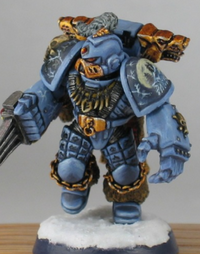
Yes, because of course the Yiffers in Space get to have not only their own set of Power Armour, but a unique pattern of Power Armour all for themselves.
The Mk.XII Pattern Lupio Runic Armour otherwise simply known as just Runic Armour is a specialized type of Power Armour used by the Space Wolves. Yes, you heard that right. The Pattern of Armour the Space Corgies have is a pattern that is ahead of the more advance and newer Mark X. Not only is it ahead, but it seems to be ahead by two marks. Whether this means that Runic Armour is more 'advanced' or was made after the Mark X is highly unlikely given that the fluff for Runic Armour is far older than the Mark X and looks more primitive. Lorefags in /tg/ are baffled at this paradox even by GW standards, with the only likely answer being either a fuck up, the Space Wolves false-promoting their new shit or a sub-mark for something else entirely.
Anyways, back on the armour. The order of the Iron Priests of the Space Wolves are often skilled at keeping their ancient battlesuits intact and battle-ready. These suits are apparently so goddamn old that they resemble more like Artificer Armour than conventional Marks. As in, they are further enhanced with runes of protections inscribed by the Rune Priests of Fenris. Space Wolves wearing Runic Armour are provided with a degree of protection from psychic attacks, so it kind of straddles the line of Aegis Power Armour and Artificer Power Armour.
Wearers of these fursuits in space are usually the Rune Priests and Iron Priests themselves, because of course these glory hogs want to wear their special fursuits they co-created and co-developed.
-
-
Iron Priest in the armour. -
Rune Priest in the armour.
Artificer Armour

Pimped out and individualized versions of regular suits, often enough to be considered one-off derivations in their own right. Artificer Armour can be formed from any older mark of Power Armour (perhaps barring Mk.I plate possibly excepting Thunder Warrior officers) by adding extra or upgraded protection. The upgraded and individualized suits mean that they require a lot of maintenance and needs techs to work around the clock to make sure they stay functional. In time suits become encrusted with unique decorations and individual upgrades and becomes known as Artificer Armour. Because of these heavy modifications, Artificer Armour is often highly superior to newer suits of standard-issue Power Armour, and afford much better protection.
So in simple terms, the more blinged-out the armour, the better it is stat-wise. With little to no standardisation, meaning that no two Artificer Armours are the same, design-wise. Standard issue for Techmarines, the Sanguinary Guard and optional for officers, pairing Artificer Armour with an Iron Halo can offer better protection than Terminator armour with none of the drawbacks, yet with only some of the benefits.
During the Great Crusade and Horus Heresy Space Marine Sergeants, the various Honour Guards (if they don't have the option of Terminator Armour) and even unaugmented officers of the Solar Auxilia could go into battle wearing Artificer Armor. Just another example in a long list that shows how the Imperium is a shadow of its former self. Yes, this means that every squad in 30k tabletop can have someone with a 2+ save in the pre-8th edition armor rules. Yes, it is hell.
-
Techmarine -
Sanguinary Sergeant -
Astorath's Spoopy Muscle Armour -
Azrael's Bathrobe Armour
Aegis Armour

The Power Armour of the Grey Knights, Aegis Armour is master-crafted on the forges of Titan and inscribed with prayers and wards to prevent Daemons from possessing it. Early fluff insinuated that several psykers were burned alive to be sacrificed as part of the machine-spirit of the armour, but this aspect has been downplayed massively in later revisions. (Considering the Golden Throne burns an ungodly number of psykers every day to keep Him alive, this isn't too farfetched; opinions nonetheless vary on whether this is true, and if so, whether it is Grimdark or Grimderp.)
Based on parts from Marks VI, VII, and VIII, within the breastplate of each set is a copy of the Liber Daemonica. It frequently bears a storm bolter on its left forearm, keeping both hands of the wearer free to use. In terms of newer fluff, each Aegis Suit is a lattice of psychoconductive filaments and amulets, wrought into hexagrammic wards and inscribed with anti-daemonic prayers, so no dumb Psychic sacrifice shenanigans there. There is an Aegis/Grey Knight version of Terminator and Dreadnought armours, too. Just remember to keep any observations that Aegis Armour look in anyway similar to Tau Battlesuits to yourself.(But it isn’t made of paper.)
Could also be the aforementioned Mark 9, since the Inquisition scrubbing it from records if that were the case would explain why we know “nothing” about it.
-
Variant 1 -
Variant 2
Auramite Armour
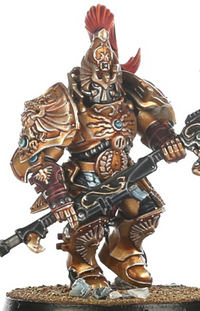
The most common power armour within the Adeptus Custodes, it is straight up in the top 3 power armours of the Imperium, its other contenders being the Aquilon & Allarus Terminator armours. The material used for its construction is known as, you guessed right, auramite (which is ceramite, except even better): The first samples and tech to make it was brought back from the depths of Terra. Another interesting fact is that the servos and motors of the Custodes armour are nearly completely silent. Turning a Custodes into a sneaky marine. A very shiny sneaky marine, though the stupidity of this is somewhat lessened by the fact that auramite's colour can be alchemically altered to just about anything.
Custodes power armour also includes a built-in Grav-chute and internal air supply (But let's be honest, the Grav-chute is all but pointless since we never see it...well...anywhere). Each suit's helmet includes an internal vox, an altimeter, ambient neutralisers, and hololithic schematic overlay map.
The armour itself is even better than Artificer armour and includes a refractor field, essentially giving it the same properties in-game as Terminator armour. It can even get a teleportation transponder as well as an Arae-shrike: a nasty (so nasty the Mechanicum declared it blasphemous) piece of archeotech that fucks up nearby cogitators. The chest piece itself is semi-modular, being able to be interchanged by three distinct variants. The first is the Auric Battleplate which is the most recognizable as well as the most common, as it was designed for the commanders of the Legio Custodes and is the most balanced of the lot. The second is the Auric Demi-Plate, a lighter version of the Custodes armour, designed for maximum maneuverability and minimal bulk; this allows clades of the Custodes that rely more on speed for their protection to make the best use of their unique wargear. The third and final variant is the Auric Warplate, the heaviest sibling as it incorporates a series of field generators that can repel even heavy ordnance, alongside the Warplates' custom-fitted plating and artfully worked servo harnesses that allows the Custodes to fully exploit their gene-forged physique on the battlefield.
The only ones allowed to make it, like all Custodes-grade weapons, are Emperor-chosen clans of Terra. Probably the only people the Mechanicus won't fuck with for fear of the golden bois getting...inconvenienced.
-
Custodian Guard -
Sagittarum Guard -
Shield Captain -
Custodian Warden
Terminator Armour
Terminator armor, or Tactical Dreadnought armor, are set aside for Space Marine veterans who are exemplars of toughness, martial ability, and wonky proportions. This power armor provides the best personal protection available. Terminator suits have an outer shell of ceramite-bonded plates powered by electrically-motivated fibre bundles. Plates of heavy plasteel further armour the ceramite sections, especially on the front of the suit. This extra armouring provides a level of protection that is far superior to normal Marine armour; not even a krak missile will penetrate the suit's breastplate (one might wonder why Imperial tanks aren't coated with this stuff until you remember the equation of cost/supply=/=demand). Moreover, external adamantium layered ribs help support this weight, while the inclusion of suspensors help the suit carry heavier support weapons, not to mention those indestructible pauldrons. A suit of Terminator armor is built to steamroll nearly everything and give a fighting chance against everything else, which are the things that gives anybody else a fighting chance against Terminators. Standard loadouts for Terminators are power fists and storm bolters, or Power weapons and twin linked bolters for the Chaos Terminators; but they also can be armed with a variety of weapons depending on their assigned role, such as thunder hammers, assault cannons, heavy flamers, lightning claws, and chainfists. They can also be augmented with a shoulder-mounted Cyclone missile rack, just to drive home the point that these guys are basically walking tanks. Since most suits are at least as old as the chapter that owns them, and that the Crux Terminatus on their left pauldron allegedly contains a tiny fragment of the Emperor's own power armor, these suits are holy relics as well as top-shelf wargear.
Despite all the pain it can lay down (and keep away), Terminator armor has a few serious drawbacks. The first issue is that it is seriously hard to make. Seriously. Most chapters have only a handful that they can distribute amongst their veterans and officers, and any lost suits are damn near impossible to replace. The second problem is that they lack mobility due to their sheer weight and bulk. Space Marines have developed a variety of workarounds, since Terminator armor can be safely teleported from orbit into the thick of it, and judicious use of teleport homers can put them right where you need them, and a heavy transport such as a Land Raider can carry small squads. Beyond that, Terminators are otherwise going to be footslogging since they're too fucking huge to hitch a ride on anything smaller than a house. Better plan on not moving them too far once they hit the ground.
Surprisingly, this mix of benefits and drawbacks is such a work of perfection that even Belisarius Cawl, known techno-deviant who pays no heed to things like 'tradition', has found no way to improve them for his new Primarysues and all he could do was find a way to refit them for the taller marines. If the former perfection is meant to be believed, that would mean that the size differences between the new-gen and the old-gen marines isn't nearly as vast as we've been led to believe this entire time. As such, loyalist Terminators can now be either firstborn or Primaris and the only way you'll know is by asking what campaigns they've been in.
There are other patterns mentioned in the fluff but not yet seen on the tabletop, or available elsewhere in such small numbers they can be counted as unique variants.
The Minotaurs have widespread access to a rare type of Terminator armour, known as the Arkonak Pattern. However, every official illustration of a Minotaurs Terminator to date has them wearing either Indomitus or Tartaros armour, including their Chapter Master (the original Tartaros Terminator model).
The First Legion's Ironwing supposedly owned the greatest concentration of Terminator suits out of any of the First Founding Legions, and included a number (plural) of experimental patterns that were unknown anywhere else. Though Forge World neglected to describe or provide rules for any of them. So as far as we know they are just functionally identical suits of normal Terminator armour that come in different shapes and colours.
Whereas Extermination claims the Alpha Legion used five patterns of Terminator armour during the Invasion of Paramar, suggesting that other patterns are yet to be revealed. Or, you know, the Alpha Legion being what it is could mean that their in house artificers are straight up inventing new technology or their infiltrators were stealing technology from other Legions.
There are also suits that can be used by regular humans, although they are incredibly rare and have to be modified and adapted in order for them to be used at all.
Nevertheless, Terminator Armor has 3 major designs: the Cataphractii pattern, the Tartaros pattern, and the Indomitus pattern. There are a few other patterns that have yet to appear in the tabletop, but have received mentions in the fluff.
Cataphractii Pattern Terminator Armour

The oldest design bar a few prototypes and the first pattern to enter mass production, developed during the Great Crusade and based on fusion-reactor maintenance suits. The Cataphractii pattern had Roman-esque, slab-like pauldrons (which apparently held shield generators), which enabled greater protection at the cost of preventing the wearer from moving with any sort of speed. It was the Mechanicus' intention to retrofit all 18 Legions down to the last Marine with Terminator armor at first, but it proved to be unfeasible as crafting that many suits would have required far too many resources. In the end they were adopted for use in those situations where even Breacher squads struggled yet heavy ordnance was too difficult to deploy, typically boarding actions and operations in heavily built-up urban areas.
After the Horus Heresy, the Cataphractii pattern fell out of general use. This may have been because the last of that armor was destroyed in the fighting and the pattern became another lost technology in the following years, or because production was ended in favor of later patterns and most of the surviving suits were either cannibalized or became relics that their chapters treated like equivalent of fine china: makes a nice display piece, but practically useless due to enforced disuse. These relics wouldn't see field use again until the day GW released the Angels of Death supplement (no doubt because they'd sell more copies of Betrayal at Calth if both 30K and 40K Marine players could use it).
In crunch terms, this translates to a higher invulnerable save than the Indomitus/Tartaros armor at the expense of being unable to run or overwatch. In 8th edition, Cataphractii have reduced movement compared to the other versions as well as halved advanced distances, but get a couple alternate weapon options and retain their boosted invulnerable saves.
9E combined Cataphractii and Tartaros Terminators into a joint datasheet called Relic Terminators. While this bumps Cataphractii terminators up to a more standard 5" movement, it also drops their invuln save back down to a standard Terminator invuln save. They have a much more specialized loadout than regular Terminators, so if you are looking for a more ranged variant of Terminators, you'll probably want to look elsewhere.
In the second edition of the Horus Heresy tabletop, Cataphractii Terminators remain lumbering slabs of "fuck you"; they still can't run or make Sweeping Advances, but they can now overwatch and they retained their 4++ invuln. Many of the Legions also have specialist Cataphractii squads, like the Justaerin, Firedrakes, Huscarls, Tyrant Siege Terminators, and Lernaeans.
-
Pict Captures -
Ultramarines -
Word Bearers -
Imperial Fists
Tartaros Pattern Terminator Armour
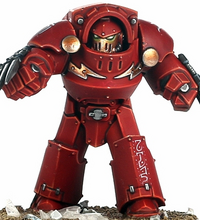
The (legally distinct) Hulkbuster Suit.
Tartaros is the most advanced pattern of Terminator armor, using systems originally developed for the Mark IV "Maximus"-pattern. Tartaros armor delivers the same level of protection as the Indomitus pattern but is much more mobile, with sensibly-sized pauldrons and an upright stance. Due to the advances in Pauldron Technology, Terminator squads in Tartaros armor can enact Sweeping Advance, unlike the lesser models. It is however the rarest of models, since it was a very resource-unfriendly model to craft back at the time of the Heresy. In the 41st Millennium, any remaining Tartaros-pattern suit that is in functioning order is a hallowed relic for whoever is lucky to have it.
In 8E's crunch, Tartaros Terminators move at the same speed as regular infantry in Power Armor (Which is pretty dang important if you're set up like an Assault Terminator) and also get a couple alternate weapon options, such as a grenade launcher and a Volkite Charger.
9E rolled Tartaros and Caraphractii terminators into a single datasheet referred to as Relic Terminators. Functionally, they're identical to the standard Terminator Squad with a minor difference in loadout options, namely the ability to take Plasma Blasters on their sergeants. Kind of a shitty fate for a unique set of models when GW is more than willing to make separate datasheets for every conceivable Primaris Marine they crap out.
Horus Heresy 2.0 returns the Tartaros to its former glory, though it still only has a 5++ invuln and loses the Heavy subtype.
-
Pict Capture -
Ultramarines -
Thousand Sons
Indomitus Pattern Terminator Armour

The Indomitus Pattern is the current pattern of Terminator armor (though the Forge World books make it clear that it was common at the time of the Heresy, perhaps more so than Tartaros and Cataphractii), sharing similarities with the Tartaros pattern in terms of functionality whilst being cheaper to manufacture.
As a later development that sacrificed a little protection for increased mobility and was (comparatively) easier to produce as previously mentioned, this was considered the Indomitus pattern go-to marketing ploy. This is the most commonly produced pattern, as Cataphractii armour was said to be in declining use due to its limitations and Tartaros armour was even more resource intensive to craft, placing Indomitus in a comfortable medium of "good enough". It has the familiar hunchbacked-bulldog/horse appearance, as seen in the majority of Games Workshop Terminator kits (although they now produce plastic kits for the other major patterns too).
Though inferior to the Cataphractii pattern in protection and inferior to the Tartaros pattern in mobility, the Indomitus pattern has advanced auto-sense systems that are unavailable in normal suits of power armour, and have not been entirely made evident from portrayals of the other types. These senses allow the user to track unseen targets and to know the precise location and condition of their squadmates at all times (while this is evident in the video games as a passive mechanic it can't really come up on the tabletop since the player sees everything anyway [except for "blips" in Space Hulk]). But these systems are noted in the RPG and various novels such as Master of Sanctity where the new user has to get used to a whole new suite of tactical information on top of actually learning how just to walk in the armour itself (hint: it's difficult).
A more interesting note is that this pattern also gave rise to the experimental Gorgon pattern (More of which can be read below), a design that was being tested during the Heresy by the Iron Hands Legion. There are also human-sized suits of Terminator armor, but the tiny amount of them that still exist are used exclusively by the Inquisition; even then, they aren't quite as potent as the versions used by Space Marines, due to lacking a Black Carapace.
-
The Deathwing is here. And it's very angry. -
Ultramarines -
Close Combat -
Blood Angels
Gorgon Pattern Terminator Armour

During the Great Crusade, the Iron Hands developed their own variant of the Indomitus-pattern, called the Gorgon Pattern worn only by the Gorgon Terminators. This armour was bonded to its wearer in a painful cybernetic connection, so he could never remove it (Kind of like loyalist fleshmetal armour), but also meant he was even more resistant to injury, and it had a unique field effect that caused blinding bright flashes whenever it was struck.
Part of the reason why this armour pattern is so cybernetically-intensive is the fact that (other than stroking the Iron Hands' technophiliac tendencies) the heat and electrochemical toxins bleeding from the suit limited the armour's agility, and its effects required a high level of cybernetic modifications for its wearer to endure.
This pattern has been nowhere to be found after the Heresy, likely because Ferrus Manus didn't live long enough to work out the kinks in the design. Although, considering how similar it looks compared to the present Indomitus, it is a possibility that the Iron Hands had a hand in the creation of that pattern, whether as the designers themselves, or some Tech-priests (or Techmarines) managed to acquire the design and tinkered with it to make cheap Terminator Armour that could actually be taken off if needed.
-
Gorgon Pattern alternate view.
Saturnine Pattern Terminator Armour
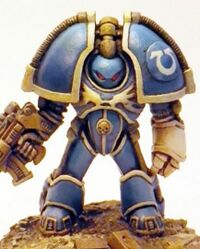
Ah...the famed egg-shaped Terminator armour which seemed to have been 'gifted' from the Squats Exo-Armour.
This was one of the most incredibly elusive patterns of Terminator armour, called Saturnine. It's got the biggest pauldrons one can get before moving into walkers category and was famous for its extreme bulk, durability, cumbersomeness and difficulty of piloting - basically everything good and bad about Cataphractii turned to eleven. It never went out of field testing phase, since Castraferrum Dreadnoughts could do everything the Saturnine pattern was designed for (boarding actions and indoor/tunnel fighting) better and without its numerous drawbacks except for needing a half-dead Astartes. Some legions still had their batches of test suits when Horus Heresy hit and used them to gain whatever edge over their opponents they could, but they were never seen after the Heresy.
Nevertheless, the Saturnine pattern has occasionally been given a passing mention in Forge World's Horus Heresy rulebooks from time to time, where it was mentioned as being similar to the Indomitus and Tartaros patterns in function (if not design). However, some people have speculated that it is a revamp of an old Rogue Trader-era version of Terminator armor, as such a suit was recently shown in interior illustrations for the novella Meduson. From the pictures, this pattern looks like it is intended as a heavy fire platform, like a less Xzibit-friendly version of 40K-era Centurion Devastators. Which is awesome. However, this specialisation, and the fact that the armour was described as a custom job devised by Vulkan rather than a general-issue design, goes against it being the Saturnine pattern.
As of the Horus Heresy 2.0 Rulebook, GW seems to have remembered it, as it shows up on the timeline as being introduced in the mid Age of Darkness. Implying it may have been retconned to being the MkV of Terminator Armor (especially since there's an 'Imperial Armour' listed far earlier, this might be the Rogue Trader terminator style). Also, the Salamanders had a hard-on for these things, as Pyre Guards were shown frequently wearing it. So if you want to see if the Saturnine still exists, its best to go to Nocturne.
-
Truly old school. -
Note the unique back-mounted weapon attachment. -
Aegis Pattern Terminator Armour
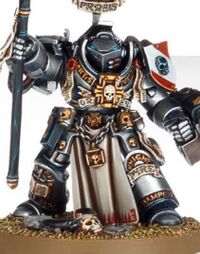
Just as how the Grey Knights have access to the normal Aegis Power Armour, the Silver Sues also gain access to the Aegis Pattern of Terminator armour, where the Aegis part essentially means the armor has its own psychic shield (inscriptions, holy water, all that blessing stuff) to deflect whatever Daemons or Psykers throw at it. Who does it anyway? Psyker Tech-priests? Nah, probably just their Techmarines.
In a sense, the Aegis Terminator Armour functions like a combination of the normal Aegis Power Armour and the Terminator Armour, creating a formidable defensive set piece against the most powerful of Chaos Daemons. These chaps are used when fighting the most clusterfuckery of Chaos invasions up to and including, a certain Daemon Primarch going on his happy murder spree on Armageddon.
They provide one of the best protection out of any armour piece save for the golden boys of course.
In 8th Edition, this pattern of Terminator Armour works like standard. However, with 2CP, you could use its Aegis abillity, which like in the Fluff, can be used in the psychic phase before a friendly GREY KNIGHTS unit attempts to deny the witch. They could then roll 3d6, picking the two highest when attempting to deny. Some Grey Knight veterans are still rather sore this is no longer part of the Special Rules which made them overpowered in 5th Edition.
-
Aegis Pattern alternate view.
Aquilon Pattern Terminator Armour
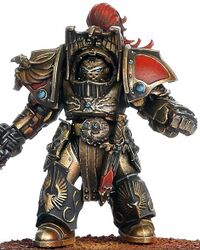
The Adeptus Custodes have Aquilon Terminators which is, no surprise, tied with the Allarus as one of the best armour sets in the Imperium. Period. The Custodes Terminators' armour was said to be Cataphractii pattern in the short story Hands of the Emperor, years before they got actual tabletop rules; this is technically still true (at least for 30K), depending on how you look at it, as Forge World made a point of describing the Aquilon pattern as a spin-off of Cataphractii armour when it debuted in Inferno, but with far greater power capacity and customized neuro-fibre uplinks, it is said, redesigned by the mind of the Emperor himself.
Aquilon Pattern Terminator Armour was said to have adjusted for the enhanced physique of the Custodes, who were capable of bearing more weight and strain than even Space Marines. This allowed it to be fitted with additional power systems and capacitors, increasing its durability and manoeuvrability. Aquilon Pattern Terminators were given more advanced weaponry than their Astartes counterparts, wielding weapons such as Lastrum Storm Bolters, Solerite Power Gauntlets and Power Talons, Infernus Firepikes, and twin-linked Adrathic Destructor. Like their lesser Auramite cousins, the Aquilon was clad in Auramite rather than Ceramite.
Within the ranks of the Custodes, Aquilon Pattern Terminator Armour was deployed by the Tharanatoi Caste. It is still issued as heavy assault armor ten thousand years after the Horus Heresy.
As expected, it has rules different from (read: better than) the Space Marine version. Much like Tartaros it can make Sweeping Advances with no loss in movement. As seen from the list of gear above, Aquilons have better stuff than what Astartes of both flavours get.
Allarus Pattern Terminator Armour
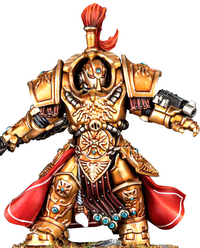
You think the Golden Custards just stopped at the Aquilon? Yeah no, they also have a second pattern called Allarus Terminator Armour for their 40K-era squads, which according to their community lore section on Terminator Armour was made the product of 10k years worth of research and development, and it shows. Lorewise Allarus Terminator Armour has greater durability than normal terminator armour, but none of the downsides, offering total freedom of movement.
Driven by magnatomic generator-shrines, articulated with leonus-class actuators, and fashioned from layered auramite and adamantium, Allarus armour is a marvel of craftsmanship. It provides its wearer with an exceptional range of movement and near-unencumbered speed, augmented strength and resilience. According to GW, it has the survivability to stride unharmed from the blast of a Macrocannon shell. Which we call Bullshit on that claim, since even the small ones from an Aquila Strongpoint is launching Schwerer Gustav-sized shells, no way in hell that the armour set, let alone the Custodes himself is capable of surviving a direct impact from that, so we could put it as more of GW shitty flowery language and hyperbole. Or someone slapped in one hell of a shield generator that constitutes the "cost more than worlds" section.
Going back on topic, the armour is also coupled with the protective blessings of the Emperor, Allarus Terminator plate is arguably the most effective man-portable combat armour in the entire Imperium. These expertly crafted suits are each individually worth entire worlds.
Crunchwise, in 9th Edition, these armour sets gift Allarus Terminators with four wounds each and equipped with Balistus Grenade Launchers in addition to their guardian spear/castellan axe...and can deep strike without needing the Stratagem to do so. Ouch. They're designated character killers, with Slayers of Tyrants allowing them to move up to 3" towards the nearest character when piling in and consolidating even if the character isn't the nearest enemy model. On the other hand, a Shield-Captain with the Allarus hass the same stat line but with an extra Wound, nevertheless, you also get the signature Balistus Grenade Launcher and From Golden Light special rule from the Allarus Terminators (for only 10 points more than the vanilla version at 109 points). You lose the Sentinel blade/Storm shield option, but the Eagle's Eye can fill in for it without making you give up any offensive capability. (Here's the humongous golden terminator daddy you've always wanted.)
Centurion Armour
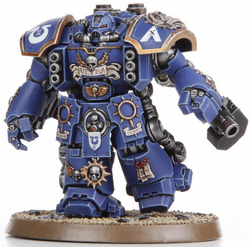
The (in)famous 'Power Armor inside of a Power Armor' set piece.
Since somebody at GW forgot that the Xzibit meme wasn't funny anymore, Space Marines now have centurion armour that they equip like a miniature walker vehicle, more like a mini-mech, a cute little dreadnought preparing space marines for their life after living. Centurion armour is "worn" over regular power armor, giving better protection (like terminator armor without the invul save but with an additional wound, along with +1 to both S and T) and comes in two flavors: assault and devastator. Assault centurions are heavy assault units equipped with drills and meltas or flamers, meant to get in close to enemy strongpoints and fortifications and wreck shit. Devastator units are heavy fire support units with hurricane bolters and twin-linked heavy weapons, which, in practice, provide less fire power than regular Devastator Squads, but higher resilience and mobility, as the suits have Slow and Purposeful.
Fluffwise, the machine spirits on this thing is advanced, almost on par with the Land Raider's. There has been once instance where a group of Salamander Centurions were deployed to clear out a Dark Eldar incursion. The Dark Eldar released a toxin that liquefied people into soup and the marines wearing the armor eventually perished after their suits took damage and the toxin leaked through the cracks. A bit miffed after the loss of their pilots, the Centurion suits' machine spirits continued to fight on, even after their pilots were just fleshy goop at this point. They were eventually disabled, but not before killing scores more Dark Eldar during their rampage.
Paragon Warsuit
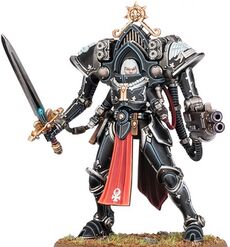
For more information, see here: Paragon Warsuit
This derpy contraption is the Sisters of Battle's new heavy armored walking suit that straddles the line between power armour and a walker. Its design has already garnered some levels of infamy that rivalled those of that embarrassingly awful rip-off of dexter (the boy genius) mech suit, due to how....off the proportions are.
So anyways, the Paragon Warsuit follows a similar principle as the Centurion Armour, which is essentially a power armour over power armour so you can shoot whilst you shoot. But that is only true if you simply take it from surface value.
It differs from the Centurion, however, in that the Paragon Warsuit is more than just a mainframe overlay. Mechanically speaking, it actually has working mechanical legs and limb joints that the user physically controls with their own movements. Therefore, the reality is that the user controls it in the same way as the Dreadknight, just on a much smaller scale. So, in a sense, it is basically the sisters' equivalent of the larger Tau Battlesuit's like the XV-8 Crisis Battlesuit hilariously enough. As far as protection goes, it seems to be on par or close to that of Centurion Armour.
Speaking of Centurion Armour, like the Centurion, the Paragon Warsuit possess an advanced Machine Spirit. Unlike the Centurion, the Paragon's Machine Spirit is quite cranky. The Machine Spirits bounded within the Warsuits trust only the 'purest' of Sisters of Battle and are difficult to tame. The wearers must possess incredible skill to operate these semi-walkers, for they are capable of extremely complex and fluid maneuvers.
Unfortunately, some sisters seem to suffer from 'open head syndrome' where they ditch their helmet to look cool, which renders the entire point of the Warsuit meaningless.
Overall, what has been said here can be further expanded upon in its main page. It is dumb, tacky and looks incomprehensibly stupid.
Power Armour of the Ruinous Powers
The Power Armour of the Ruinous Powers are as varied and random as the very patrons they worship. Millennia of disrepair and maintenance had forced many traitor legions to scavenge for parts through raids and pillaging. Like, if you thought the Heresy Armour was a hodge podge clusterfuck, the post-Horus Heresy traitor legions make these Mark Vs look consistent. This is not to say that the average Chaos Space Marine is running around butt-ass naked like a murderhobo. It just depends on the warband.
Some much poorer and fractured warbands like the World Eaters, Emperor's Children and Night Lords are caught struggling to even find a pauldron to make ends meet. But other more advanced and industrialised Chaos factions like the Thousand Sons, Word Bearers and Black Legion is far more standardised as they have their own independent industrial base. Other traitor warbands like the Iron Warriors manage to even maintain a healthy pre-Horus Heresy era power armours for the sheer fact that they have a strong industrial culture and that don't lick the Warp's asshole. And then there is the Death Guard, which is a special case, since their disrepair is intentional given that they are one of the better organised ones. Likewise, non-Chaos Space Marine factions like the Dark Mechanicum also maintain a strong industry in consistent power armour production and design, for a fee of course.
Nevertheless, when it comes to the Power Armour of the Traitor Legions - for the consistent ones at least - there is a distinct pattern for each one of them. Although they are unnamed and are most likely intense modifications/sub-patterns of Great Crusade-era and Horus Heresy-era armours.
Chaos Power Armour

While many Traitor Marines are equipped with Marks IV or earlier (at least in the lore; if you go buy the models, almost all of them seem to have Mark VII armour, Mark III shoulder pads with Mark VI legs), Chaos power armor is often a mix-and-match setup. About the only unified feature of Chaos power armour is a distinct power pack with stabilizers on long curved fins, that still runs on solar converter core instead of fusion reactor of modern loyalist power packs. Because Chaos Marines often have to go long periods with no access to proper industrial facilities, proper maintenance and replacement parts became an issue (because a faction named chaos may not be so good at logistics afterall) . Because of that, many subsystems in each suit of armor don't work and replacement parts come in the form of whatever they can dig up from plunder and take off of corpses after raiding and looting. Furthermore, Chaos Marines like to customize their armor with devotional iconography and personal trophies, making sure that virtually every suit of armor is personalized and none are exactly alike. Where things get even weirder is when the armor gets too steeped in Chaos and begins to twist, mutate, and turn partially organic, or had a daemon replace its machine spirit. It's quite likely that the parts of armor that don't work get replaced with warp magic, daemonic influence, or Dark Mechanicus tech-heresy.
Recent editions and artwork show senior Chaos marines with a sinister and more organic-looking power armour of Mark III through V, a look they pick up after a while either deliberately or due to the Warp's influence changing their outside look to match their corrupted souls. In the Rogue Trader Era, Chaos Power armor was organic, so this is actually a pleasant return to the old days. The Chosen models from the Dark Vengeance box set are commonly referred to as the harbringers of this new style, while the new Raptors/Warp Talons set incorporate this design, alongside the regular Raptors, whose design seems like being "metal-guilded armour, that's begun to blend together and form spikes and weird shapes", hinting of what's to come for the aging Chaos Space Marine range.
As of 2016, the non-Terminator-armoured Thousand Sons are now fully equipped with modified, ornate suits of Mark IV armour, in the style of the original Jes Goodwin Thousand Son model and concept art that established their aesthetic back in the old days. Since most of them aren't really capable of changing out of their armour anymore, this makes their current models their most lore-friendly--and least neckbeard-enraging--incarnation yet.
And then, in 2017, GW started releasing new Death Guard Space Marines. The ugly bastards pretty much relive the original style from the old Forge World Death Guard upgrade pack (itself a throwback to Jes Goodwin's Rogue Trader-era Death Guard concept), decked out in rotted, space-AIDS-riddled suits of Mark 3 armour, with most sporting the classic reinforced belly plate to hold in their bloated guts and intestines.
2019 finally saw a major update to the main Chaos Space Marine line, including two new kits for the basic Chaos Marine squad (a fully monopose, set-loadout one in the Shadowspear box, and a semi-monopose standalone version with more head and weapon options a few weeks after). The new sculpts are like a less ornate version of the Dark Vengeance Chosen, mixed with the old-Mark-heavy look of the 2nd edition CSM metals, and with better proportions than both. The new Chaos Havoc kit extends this style further by adding recoil-dampening talon mutations on the boots, as well as Mk III-inspired reinforced frontal plating (although the actual suits seem to be based on Mks V and later).
In preparation for Horus Heresy 2.0 we got an "Armour through the Ages" article in White Dwarf 469 (nice), making particular note of the preferences of the remaining Cult Legions, with the World Eaters preferring Mk V and the Emperors Children hogging Mk VI (also in Line with Jes Goodwins original concepts). Thus we can conclude that once, if ever, Geedubs get's around to it we'll see Studs and Beaks galore all nice and corrupted.
Raptor Storm Armour

A piece of power armour pattern worn exclusively by Chaos Raptors.
Resembling heavily modified Maximus Armour, Raptor Storm Armour has gone through so much design changes and modifications that it effectively became its own thing. The Jump Packs used by Raptors are considered to always come with the armour system and are viewed as prized relics and badges of honour. Often the armour of a Raptor is modified with amplifiers and vox casters to emit terrifying sounds used to disorient their enemies, making them easier to shank, so the helmets also differed despite their wide variation; with the most consistent pattern being the addition of extra 'face grills'. Who exactly is giving them all these cool stuff is not known, although it is highly likely to be from the Dark Mechanicum.
Since Chaos Raptors consider themselves to be the ultimate predators of the battlefield, that rapidly turn their targets into giant shish-kebabs. The Raptor Shock Armor is designed to enhance this impression, with their spikes and sharp edges placed everywhere. They differed a lot from their old models where the changes were far more drastic, such as their distinct 'screamo' helmet and cybernetic bird claws for feet.
Crunchwise, they are statistically viewed the same as standard Astartes power armour, so yeah, no screamo abilities unfortunately.
They were also shown as an armour unlock for Warhammer 40,000: Space Marine the Vidya for the Chaos faction.
-
Old school Raptors
Sorcerer's Power Armour

The yet unnamed pattern of Power Armour that is often worn by Chaos Sorcerers.
Like the Grey Knights, Sorcerers of the Ruinous Powers were their own specially designed mark of Power Armour to both assist in their psychic abilities and avoid getting turned into a You-Know-What (Success varies a lot). Each of these suits of armour are ancient, denoting their equally ancient wearers, and are marked with countless sigils of dark sorcery. Now a certain select Sorcerer Lords are known to opt in for Terminator Armour if given the chance like Nemeroth, but most of them prefer the more mobile pattern of Power Armour they usually strut around in.
They are also all highly individually stylized. Not one Sorcerer looks identical to the other, even by Chaos standards. No surprise given the sheer ego-trip of these guys. If there is one thing that stayed consistent of these nerds from hell, is that most of them wore extremely....pronounced helmets. Like we are talking helmets with horns that make Dark Helmet from Space Balls look modest. Another consistent piece of attire is that all of them wear a robe, because you know, Space Fantasy and all that. Likewise, none of them wear a Librarian's Hood since they are already neck-deep in Chaos shenanigans, so the hood is effectively useless, and that all Sorcerer's Power Armour - as aforementioned - is covered in sigils of dark sorcery that aids them in battle (Which as you can imagine, is the complete opposite of Aegis Armour and its protective wards).
In terms of stats, they are pretty standard, so don't expect anything out of the ordinary.
-
Old school Sorcerer with its infamous helmet
Warp-Forged Armour
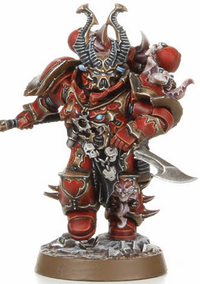
Warp-Forged Armour is a type of armour worn by the warriors of Chaos. It is, as its name implies, forged from the Hell Forges of the Forces of Chaos. As such, these armour are partially daemonic and, given the lack of supplies from the Traitor side, it sort of counts as a form of homegrown power armour. Warp-Forged Armour is often made by either the Dark Mechanicus or the Iron Warriors, as these chaps are the only ones with the know-how in how to create and maintain these things. These armour pieces are mutated and possessed by a Neverborn and often worked in-tandem with their wearer.
One major advantage of these armour pieces is the fact that being partially daemonic, Warp-Forged Armour could heal over time, which eases the maintenance cost by a whole lot, and given that CSMs are in constant need for a diaper change, this means A LOT.
This daemonic armour is laden with unholy runes, allowing Champions of Chaos or Daemons wearing it to be all but immune to the blows of enemy mortals. In part of its nature, Warp-Forged Armour can be considered as the Chaos equivalent of the Grey Knights Aegis Armour. Chaos Champions and Chaos Lords who adorn these armour pieces could gain the added benefit of their armour regenerating due to it being partially daemonic.
They offer the middle ground between normal Chaos Powered Armour and Fleshmetal Armour.
Also, it’s partially daemonic. In case no one told you.
-
Chaos Chosens in Warp-Forged Armour
Chaos Terminator Armour
Just like their loyalist counterparts, Chaos too has its own pattern of Terminator Armours. Most of which are of the older Cataphractii and Tartaros Patterns since Chaos aren't known for its high maintenance standards, so by the 41st Millennium, some factions have kitbashed entirely new patterns for their Terminators.
Chaos Terminators as such, come in a variety of colours and flavours just like their loyalist counterparts. This is seen in the following:
Chaos Cataphractii Pattern Terminator Armour

During the Horus Heresy the Traitor Legions fielded units clad in Cataphractii armour just like their loyal brothers. They offer the most protection and are thus the toughest of the Terminator suits and are able to take immense punishment before suffering mass systems failure. They were armed with Combi-Bolters, powerfists and Grenade Harnesses, but also had access to Chainfists, Lightning Claws, heavy flamers and power swords.
Like their Tartaros cousins, they aren't as twisted as the Indomitus due to their rarity and lack of exposure from the Warp. Whatever is left of these tainted Cataphractii are now irreplaceable relics since Chaos can't maintain for shit. So they are usually of much inferior quality as a whole. On the bright side, Chaos Space Marines could be blessed with the Four Chaos Gods for additional quirks.
Crunchwise, they behave similarly to their loyalist counterparts, with the addition of having Chaos-aligned special rules and CP. In a nutshell, they are tanky, tough and has access to the favours of the Chaos Gods which makes them more individualised than their loyalist counterparts.
-
Chaos Cataphractii Terminators. -
Chaos Tartaros Pattern Terminator Armour
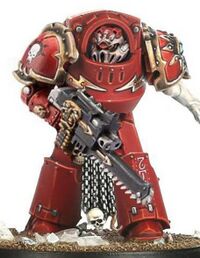
During the Horus Heresy the Traitor Legions fielded units clad in Tartaros pattern Terminator Armour, just like their loyal brothers. The most advanced and most mobile of Terminator suits, the Tartaros are surprisingly fast and can initiate a brief but surprising burst of speed to catch their enemies off guard. They are armed with Combi-Bolters and powerfists, but have also access to Lightning claws, Chainfists, Reaper Autocannons, Plasma Blasters, Heavy Flamers, Grenade Harnesses and Volkite Chargers.
Like their Cataphractii cousins, they aren't as twisted as the Indomitus due to their rarity and lack of exposure from the Warp. Whatever is left of these tainted Tartaros are now irreplaceable relics since Chaos can't maintain for shit. So they are usually of much inferior quality as a whole. On the bright side, Chaos Space Marines could be blessed with the Four Chaos Gods for additional quirks.
Crunchwise, they behave similarly to their loyalist counterparts, with the addition of having Chaos-aligned special rules and CP. In a nutshell, they are nimble, tough and has access to the favours of the Chaos Gods which makes them more individualised than their loyalist counterparts.
-
Chaos Tartaros Terminators.
Chaos Indomitus Pattern Terminator Armour
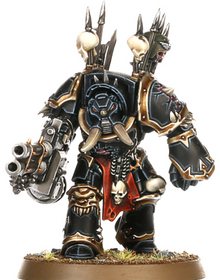
The most common and widespread Chaos Terminators and the most obvious. Similar to their loyalist counterparts, they are the most adaptable of the Terminators and are by far the most twisted looking due to the majority of Chaos Terminators wearing this particular piece of armor. Chaos Elephant Terminators are known for their notable tusks which has become an icon for Chaos Terminators. This is where the nicknames come from.
Now that the Horus Heresy fluff has been expanded, it is rather bizarre that these are the most common Chaos Terminators, as Indomitus Armor only became widespread after the Heresy, so most Chaos Legion Terminators should be wearing Cataphractii or Tartaros. Then again millennia of warfare and degradation has probably resulted in Cataphractii and Tartaros armour becoming quite rare due to the increasing difficulty in repairing it.
On the tabletop, these armour gives Chaos Terminators 2 wounds (3 wounds now!) per model, making them as tanky as their loyalist counterparts with the addition on gaining access to the favours of the Chaos Gods which makes them more individualised.
-
Chaos Indomitus Terminators. -
Scarab Occult Pattern Terminator Armour
See Main Page: Rubric Terminators

AKA Rubric Terminators or the Sekhmet. Scarab Occult Terminators were once the finest psykers in the Thousand Sons, bodyguards to Magnus the Red himself. Like their brothers, they were affected by the Rubric of Ahriman spell and turned into dust. Now they stride into battle at side of their sorcerous masters. Clad in ornate armor, they are armed with Khopesh blades and Inferno Combi-Bolters. The unit has also access to Heavy Warpflamers, Soulreaper Cannons and Hellfyre Missile Racks. The Sorcerer leading his unit also wields a Force staff.
Compared to most CSM Legions and Warbands, the Thousand Sons actually maintain their equipment quite well. While some may accuse them of excessive Nerdom, it may just be a manner of common sense which is a rare commodity in Chaos.
Strangely, the Sekhmet were the finest psykers of the Sons, so it is strange that they were rubric'd. However, the Sekhmet were rather emotionless and lacking in ambition, which doesn't fit well with Tzeentch's ideal sorcerers. Thus, rubric.
On the tabletop, due to being inanimate automatons, they get 2+/4++ saves as well as Fearless. What is surprising is that they lack the Slow and Purposeful rule, which actually makes them quite nimble for a bunch of walking trash bins. However, they still share in the Rubric Marines other traditional weaknesses. Such as general idiocy without a Sorceror and the lack of options to negate cover saves is a particular issue as the targets you'd want to use them against the most.
-
Scarab Occult Terminators. -
The Sekhmet Scarab Occult, pre-Rubric'ed.
Blightlord Pattern Terminator Armour
See Main Page: Blightlord Terminators

Blightlord Terminators serve as the disease-ridden elite of the Death Guard. They are bloated with disease and a myriad of parasitic organisms that spread a miasma of death and decay around them. They are so bloated with filth that their mobility has crawled to a snails pace; even regular Plague Marines can outwalk them. Despite this, they are orders of magnitude tougher then even regular Chaos Terminators and their status of being below a Deathshroud in rank is not to be underestimated.
Due to their level of mutation, they are forever fused with their mutated suits of Cataphractii Armour (A bit like Fleshmetal but more smelly), Blightlord Terminators combine diseased resilience with the protection and firepower of a standard Terminator. In battle, they serve as the elite shock troops of the Death Guard and are present in most warbands of the Legion and are essentially a neigh-unstoppable rape train.
Compared to the Thousand Sons' Scarab Occult Terminators, the Death Guard are the direct opposite when it comes to maintenance, for obvious reasons. Seriously, forget about even scavenging their equipment. Look at the damned thing.
Crunchwise, since they have Cataphractii armour, they are naturally a bit tougher than the standard Terminator. Since they are Nurgle's boys, they also get the standard +1 toughness and 5+ Disgustingly Resilient that regular Plague Marines get. All in all, a tough bastard to crack.
-
Blightlord Terminators.
Fleshmetal Armour

Essentially the Chaos Marine's take on Artificer armor, given only to champions favored by the Chaos Gods, although it would be much more accurate to call it as a type of Terminator Armour.
A blast from the past editions, Fleshmetal Armour is how it sounds. After spending gods knows how long in the Warp and centuries of combat under chaos, it eventually caused a chaos marine's power armor to fuse with their own flesh, forming an incredibly hard, organic carapace, tempered by ceramite and reinforced with warpfuckery.
Once a marine receives this gift, they're now more literal weapons than ever, as the armor cannot be removed anymore (since its now their second skin), condemning them to an eternity of unending war. Of course, since Chaos Marines live for that kind of thing, its more of an encouragement than anything. The only exception to this are Helbrutes, who are driven mad by the process.
Like Warp-Forged Armour, Fleshmetal Armour could heal over time due to being partially daemonic. This eases up on maintenance as wearers of this piece of equipment aren't desperate to scavenge for bits and pieces if one of their servo-motors stopped functioning. The one major downside is...well...you can't take it off now can ya?
Just about any Chaos special unit or veteran has fleshmetal armour, like Obliterators and Chaos Chosen.
-
Obliterators in Fleshmetal -
Mutilators in Fleshmetal
Tau Battlesuits
Main Article: Battlesuit
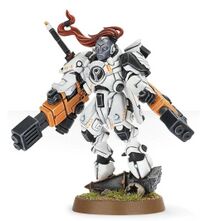
The Tau take on "power armor" is a bit more diverse compared to the Imperium because it encompasses both personal protective suits, like stealth suits, and giant weapons platforms, like Riptides. Essentially, the Tau classify everything from enhanced flight suits to nearly Knight-class units as "Battlesuits".
Pound for pound, Tau battlesuits generally have lower raw protective capabilities than their Imperial counterparts. However, they make up for this by having extremely advanced subsystems, high mobility, and devastating weaponry. The Tau Empire is also capable of mass-producing all its suits, in contrast to the Imperium which often resorts to assembling such advanced battlegear in an inefficient, individually handmade, boutique-style fashion.
It is important to note that Tau battlesuits can vary quite widely in form and function. Suits like the XV15, XV22, and XV25 are the closest in form to what the Imperium would consider true "worn" power armor. Meanwhile all medium-sized suits, which includes most designations from the XV8 through X104, are essentially small Mecha, with the pilot fully enclosed in a cocoon-like cockpit. Tau suits are certainly quite durable, but in contrast to Imperial designs sheer protection is not necessarily their most important function. Finally, the Tau place the largest units such as the KV128 and KX139 in a different category called Ballistic Suits, and do not consider them battlesuits as such.
-
XV15
-
XV22
-
XV25
Eldar Armour
Main Article: Mesh Armour, Aspect Armour, Exarch Armour, Phoenix Armour and Rune Armour

The Eldar use Mesh Armor technology to supplant their powered armor suits, said armor is made out of a combination of wraithbone and thermoplas, all woven together to make a futuristic mail armored suit. The suit is psychically attuned to the wearer's mind, so it is capable of tailoring its fit and use to the wearer's style.
While mesh armor doesn't seem or look all that tough, it's protective quality comes from it's ability to actively harden specific parts of the armor on neural impulse. Upon taking a hit, it will attempt to reduce damage by bulking up the affected part, then spreads the force of the hit's impact throughout the armor, which reduces the pain and injuries taken by the wearer since its not being concentrated to a single point of their body. We're not exactly sure how feasible this is, since the hardening only occurs upon getting hit (which means that the armor only has mere microseconds to do all this upon an object striking it), rather than in-anticipation like how reactive armor works IRL, but we're going to chalk it up to futuristic spehss elf magic.
There are currently a couple variants:
- Mesh Armor - Standard armor worn by guardian squads. Its also equipped with life-support functions and sensory equipment.
- Aspect Armor - Aspect armor are worn by Aspect Warriors. Each aspect shrine has their own take on Aspect Armor depending on their role, so Swooping Hawks and Howling Banshees have lighter armor, while Dark Reapers and Fire Dragons have heavier armor (although "heavy" is subjective as it still allows the wearer to be nimble like every other Eldar warrior). The main thing in common they have though, is that they're much more durable and flashier than standard mesh armor.
- Exarch Armor - Aspect armor worn by Exarchs. Because of the Exarch's seniority and experience; the armor is typically much more blinged out than the standard variant, offering the wearer more protection and other equipment options. Exarch armor is also adorned with the spirit stones of deceased Exarchs, bestowing the wearer with literally millennia of combat experience from past heroes.
- Phoenix Armor - The armor worn by the Phoenix Lords. Is so expertly made that it can withstand all but the most powerful and/or luckiest of hits, even after thousands of years. Phoenix Armor also stores the consciousness and memories of the original wearer, so in the event a Phoenix Lord falls in battle, he will be instantly revived when another living Eldar dons the armor again (although it has the questionable effect of completely overriding the future wearer's mind, with the Lord effectively making the unfortunate recipient a flesh puppet).
- Rune Armor - Mesh armor worn by warlocks and farseers. Along with standard mesh armor tech, the suit is also inscribed with several runes that afford the wearer a greater deal of protection from damage, and also to better attune them to psychic energy. It also comes with an extra layer of wraithbone for more protection.
Dark Eldar Armour
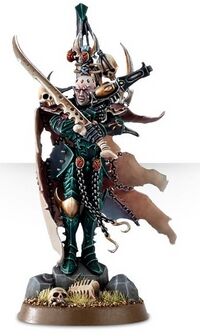
The Dark Eldar's armor is similar to their Craftworld cousins, although even lighter to accommodate the Dark Eldar's penchant for coke-fueled speed. Skimpier in the case of Wyches, who's career require them to show skin. They're also adorned with a plethora of spikes and blades, to the point that realistically: all those pointy sticks must affect unit cohesion and personal movement while in combat.
The few variants they have are:
- Kabalite Armour - The combat armor worn by just about every lowly kabalite that isn't going in naked. To further aid in movement: Kabalite armor is typically just a bodysuit, with armor plates attached where appropriate. They function similarly to mesh armor, in that the bodysuit hardens on neural impulse to deflect damage more effectively, and pressurized to allow the wearer to fight in hostile environments. Its also very, very spiky.
- Wychsuit - Not really "armor" per se, as a lack of one, but included for the sake of reference. Wych suits are flexible body gloves, cut away at certain places to show the Wych's good sides to the crowd while fighting in arenas or in the field. It offers very little protection due to the latter fact, as it's role is more for entertainment, than pure combat.
- Incubus Warsuit - The closest thing the Dark Eldar have to traditional power armor. It affords similar protection to that of Imperial power armor, whilst being so expertly manufactured that it doesn't inhibit the wearer's reflexes and agility in the slightest. The warsuit is completely exclusive to the Incubi, and not even Archons can pay/intimidate their way into getting a personal warsuit.
- Ghostplate Armour - Armor used by the poncier gits in Dark Eldar society, most notably Archons. The armor offers much better protection than bog-standard kabalite armor, whilst having a built-in forcefield generator. It also doesn't compromise on agility, as the resins used in it's construction are lighter and tougher.
Ork Armour
Main Article: Mega Armour
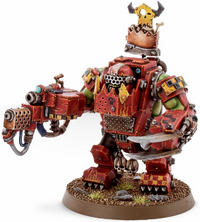
The only known variety of Ork power armour is Ork mega-armour, a direct Orkoid equivalent to Astartes Tactical Dreadnought armor. It basically looks like a chunk of metal or vehicle parts strapped together and called 'armour'. Or a miniature power lifter, whatever fits your definition.
Its weight (a ton or more) and complexity make it difficult to move and slow down its user, but it can withstand insane amounts of punishment, almost as much as Imperial Terminator Armour. Piston-enchased metal limbs of mega armour give the wearer phenomenal strength, and it incorporates fearsome weapons: a Power Klaw and Kombi-Weapon or twin-linked Shootaz. It often involves the use of built-in bionics and is very complex, which makes it very hard to manufacture, so it is a rare sight in Ork armies. Usually only Nobs (who like to call themselves "Meganobs" after acquiring Mega Armour) and Warbosses can afford such armour.
-
Big Mek
-
Ditto
-
Warboss
BattleTech Battle Armor
Powered exoskeletons were a thing for civilian purposes in Battletech for centuries for industrial uses and some comparatively light power armor suits were used by the SLDF special forces in the 28th century and during the Amaris Civil War. However, it only really took off and came into it's own league in 2842 when Clan Wolf took Clan Goliath Scorpion’s armored diving suit design called the Water Elemental and militarized it. This development happened alongside Clan Hell's Horses coming up with a new beefed up strain of 2-2.5 meter tall Warriors, who they soon were plunking into these new suits. The result were known as Elementals, a nasty surprise for the Inner Sphere when they showed up in 3050.
Add the development of OmniMechs with universal docking ports, and the Clans developed new type of armored infantry who could recharge while riding BattleMechs into battle over vulnerable armored transport vehicles. Battletech Power Armor tends towards the bigger side of things. An Elemental Suit would weigh one metric Tonne, can tank some fire from BattleMech-scale guns, comes with a Power Claw equivalent to shred armor, a jump-pack to get away, and packs some serious firepower with an arm-mounted lascannon alongside shoulder-mounted missile pods. The Inner Sphere responded by eventually developing the Inner Sphere Standard battle armor but were initially restricted to commando drops or defensive warfare due to a lack of mass production or OmniMechs.
Post Truce at Tukayyid, both Spheroid and Clanner factions began experimenting with a variety of designs ranging from light patterns capable of flight to quadrupedal one-man tanks able to take a BattleMech las-cannon blast to the face and still be able to fight.
Battle Armor Systems
Based off their Powered Exoskeleton relatives used in civilian work, Power Armor shares many of the same systems such as environmentally sealed life support, myomer-enhanced strength, an armored chassis, and an electrical military power pack with enough charge to continuously last 24 hours before a recharge or replacement is required. What makes them different is typically the inclusion of weapon mounts, an automatic medical aid dispenser, and either a power claw or a magnetic clamp to hitch a ride onto any allied OmniMech or Combat Vehicle for transportation. Smaller humanoid versions may come with either armored gloves, a basic manipulator, or a battle claw for picking up or working with items while more heavily armed models or quadrupedal ones will forgo them entirely. Some specialized variants come with advanced equipment like stealth armor, jump jets, Harjel dispensers, an ECM suite, a BC3 network system, or Modular Weapon Mounts. Many are also easily field stripped instead of requiring a dedicated fitting bay though quadrupedal Battle Armor is even more awkward to pilot with a cramped cockpit compared to humanoid models that fit like a second skin.
Battle Armor Models
Like their BattleMech brethren, Battle Armor is generally categorized into weight classes with each having tradeoffs in terms of speed, stealth, armor, or firepower: Personal Armor - Light (500 kg), Light (750 kg), Medium (1,000 kg), Heavy (1,500 kg), and Assault (2,000 kg). This is rather on the chonky side as even Light Battle Armor weighs more than Astartes Power Armor does. Below is a brief sample of the various Battle Armor models found in the game:
Clan
- Elemental (Clan Wolf, though soon every clan was churning them out once they won the production rights or stole the designs): The Original Battle Armor and the measure that every other is compared to. It's a versatile jack-of-all trades and a Medium weight design. Humorously enough, they were nicknamed “Toads” by the Inner Sphere militaries due to their chonky appearance and jumping capabilities.
- Sylph (Clan Cloud Cobra): One of the four prototypes from the Elemental Battle Armor's early days, the Inner Sphere's experimentation with other weight and specialties prompted the Clans to perfect them. The Sylph is a Light flying design that fills a niche between Jump infantry and Battle Armor at the cost of having lighter armor and a more difficult training regime.
- Undine (Clan Goliath Scorpion): Basically an up-armored and armed version of the original Water Elemental submersible exoskeleton used to create the original Clan Elemental Armor, it's an amphibious combatant derived from the four prototypes.
- Salamander (Clan Fire Mandrill): a Medium class suit based off one of the four prototypes, it's specialized as a fire-starter and anti-insurgency specialist against infantry. While its reincarnation's flamers can cause heat overloads on BattleMechs, many Clans weren't fond of the original prototype at first for being a second-line design instead of a front-line one.
- Gnome (Clan Hell's Horses): A Heavy design based on a one of the four prototypes (in this case, a failed one called the Rhino), the Draconis Combine's development of an Assault Battle Armor capable of withstanding a Heavy Laser prompted the combined-arms themed Hell's Horses to one-up their own answer. While weighing less than the Kanazuchi that prompt its development, it offers near-equal protection while being heavily armed and twice as fast.
- Golem (Clan Ghost Bear): Seeing how their rival Hell's Horses and Kuritan adversaries were developing Assault Battle Armor, the Ghost Bears created own answer with a pure Assault Battle Armor. While it can't jump, it's much faster than other Assault suits and is armed to the teeth as a weapons platform.
- Corona (Clan Star Adder): Created by Clan Star Adder, this one is an Assault Battle Armor designed explicitly around a Medium Pulse Laser as a stand-off weapon to threaten Mechs from a distance. While it can't jump, it's transportable via OmniMech and is twice as fast as the Elemental Battle Armor.
Inner Sphere
- Night Hawk (Star League): a Personal Armor - Light design, it was originally designed in top secret for the SLDF's special forces. Unfortunately it was never mass produced for general use and any survivors remained mothballed under ComStar's armories until after the Clan Invasion. While revolutionary for being the Clan Elemental Armor's grandfather alongside the Water Elemental armored diving suit, it's essentially just a sneak suit mounting body armor alongside armored gloves, jump jets, and an ECM suite.
- Tornado (ComStar/Word of Blake): another Personal Armor - Light model reversed engineered off the Night Hawk, it's custom tailored to the user and so isn't easily mass produced. It does come with a low resolution mimetic Camo System and is popular for special forces or militia if heavier Battle Armor is prioritized for front line combat units.
- Purifier Adaptive (ComStar/Word of Blake): A Medium Battle Armor designed by Comstar but produced by the Word of Blake and later the Republic of the Sphere. While not extraordinary in combat performance, it literally can be rendered invisible to sensors and eyes with its Memetic Armor system (which later evolved into the BattleMech Void Signature System).
- Inner Sphere Standard (Federated Commonwealth): The first Inner Sphere produced Battle Armor. Based off of captured Elemental Battle Armor, this Medium was quickly pressed into service against the Clan Invasion and served as a default suit sold across the Inner Sphere with multiple other suits based off it with mere anesthetic national cosmetics as a differentiator.
- Hauberk (Federated Suns): Based off Undine units bought from Clan Sea Fox, it was redesigned as an Assault unit that, while slow and requiring APC's instead of OmniMechs to transport, is heavily armored and given respectable armament.
- Infiltrator Mk I & II (Federated Suns): A generalist Medium design, the more primitive Mk I and the streamlined MK II are both among the first units designed to use Stealth Armor to aid in hiding it from detection. Former is more focused in recon than combat while the latter used data off reverse-engineered Night Hawk suits helped redesign it to have a mini Gauss Rifle.
- Sloth (Lyran Commonwealth): One of the first Quadripedal Battle Armor designs, this Heavy suit is designed for as a low-laying heavy weapons platform. However, it can't use its limbs for manual manipulation of items like a power glove or combat claw while being unable to ride OmniMechs.
- Grey Death series (Lyran Commonwealth): Coming in Infiltrator, Scout, Standard, Heavy, and Strike variations, this series of Battle Armor is unique in that it was developed and mass produced by technicians and facilities owned by the House Carlyle, Lyran owners of the Grey Death Legion mercenary unit. It has a diverse set of suits for multiple roles.
- Kanazuchi (Draconis Combine): An Assault Battle Armor created as a private project by the Combine's MIC, the first few prototypes had disastrous performance records to the point that it was almost shelved permanently. Only later with the second prototype was it given funding before being live-tested. While the Mad Cat ER PPC destroyed the unit, the pilot survived and proved that the suit was useful for infantry seeking to survive fire from an Assault Mech.
- Raiden (Draconis Combine): Essentially a Combine improvement to the Inner Sphere Standard. Unfortunately, the first prototypes suffered delays as the Coordinator wanted it to survive a hit from a Large Laser instead of a Medium Laser. He also ordered the chief designer to be the live performer for the test. Despite being 70 years old, the man put on the suit and proved that it can withstand a weapons barrage despite the suit being left barely functional.
- Kishi (Draconis Combine): The little guy of DCMS's Battle Armor fleet; weighing in at only 750kg and designed for urban combat. It's cheap and easy to maintain while being based off of data the DCMS obtained from partnerships with the Nova Cats.
- Leonidas (Free Worlds League): A Medium weight battle armor, it is highly configurable and is capable of acting as a commander, a guerilla, and other roles due to its modular weapon mounts and wide pool of weapons configurations.
- Longinus (Free Worlds League): A Medium weight Battle Armor, this model is the closest an Inner Sphere military ever got to reverse engineering the Clan Elemental Armor's simultaneous possession of Jump Jets and shoulder-mounted missile launchers. However, the Jump Jets are only usable once the disposable missile launchers are expended and discarded.
- Trinity (Capellan Confederation): Developed by the Capellans alongside the Taurians and Canopians, these Medium weight suits are known as Ying Long, Asterion, and Theseus respectively in their home countries. While a respectable suit, all three nations had various tensions form various political divisions such as reverse-engineering, tech monopoly, and lack of manufacturing coordination.
- Shen Long (Capellan Confederation): A Heavy quadrupedal armored suit, it possesses a stealth armor chassis and a modular weapons turret to enable it to act as a nifty skirmisher.
- Centaur (Republic of the Sphere): Designed secretly after the Jihad, this Heavy humanoid battle armor can convert from a standard configuration to a stationary quad configuration with extendable support stabilizers as a portable mini artillery piece.
- Simian (Republic of the Sphere): Another design the Republic secretly developed after the Jihad, this gorilla-themed Battle Armor is a Medium weight class with lots of speed and a lot of conventional weapon loadouts to lesson costs.
Fallout Power Armor
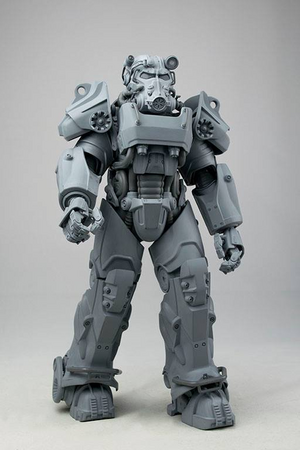
Unlike Warhammer 40,000, Fallout powered armor is Fluff-wise more "power" than "armor". It was originally made to allow troops to use heavy weapons on the move and with increased weight limit it was obvious to put some extra armor on the exo-suit. Even while it turns you into a nearly-indestructible walking tank, there is no shortage of stupidly powerful and/or armour-piercing weapons in Fallout, so sneaking and camouflage are always considered better protection than armor, so the main reason people use it is strength and radiation resistance bonuses. It is also possibly the most realistic armor here, strangely. Around Fallout 1 and 2, power armor was an almost cheat button up to the endgame, with an obscene bonus of +3 STR and near immunity to all small arms fire up to energy and heavy weapons (and Gauss in Fallout 2).
Afterwards came Fallout 3, where a leather jacketed character high on morphine could soak more damage than a sober power armored dude and mow him down with a cheap Chinese assault rifle. It had become a glorified metal full plate, met with RAGE until New Vegas came with some decent power armor, though it still got overshadowed by a badass riot armor that didn't need training(Lonesome Road DLC) or a clingy female AI driven stealth suit(Old World Blues DLC).
Power armor got a massive overhaul in Fallout 4, turning them into basically an infantry fighting vehicle rather than just better armor. The crafting system extends to upgrades and new systems for the armor, including neat stuff like a stealth field and a jet pack. On one hand Fallout 4 is one of the few games where power armour feels like actual power armour and not just the best armour you can get, but on the other, it was so strong they couldn't help but give it to you right at the start of the game (because working towards rewards requires an attention span they don't think we have, apparently) and had to change the fact power armour comes with an internal battery so you could only use it until you ran out of fusion cores. Which you never did as they were cheap to buy.
Power Armor Frame

Developed sometime after Alaska, the Army showed worry in maintaining the suits of armor they already had during a possible Chinese invasion. With multiple varieties currently in use, and more being developed, a version designed for ease of maintenance was going to be required. Instead, this was developed. Basically all the wires and joints of the armor without the actual armor, one can easily slap individual power armor sections onto the frame allowing for bits of damaged armor to be used to form up a singular complete suit. Think the Heresy armor from 40k above. With the internal workings bare it also made modifying and maintaining the armor a total breeze, though did come at a cost. All American armor post T-45 used a internal reactor allowing for centuries of use before requiring a recharge. Since every armor variety used a different level of power, putting in a reactor would have resulted in a situation of either too much or too little power being produced, resulting at best a sluggish barely working suit and at worst a nuclear explosion. Instead commonly used fusion core batteries were used as the power source. While these cores did hold much more power then the Microfusion packs of the T-45, they still didn't last long when used.
Fluffwise, a fusion core battery lasted around 10 hours on full charge, and that's just moving on a brisk pace, no sprinting or doing fast combat maneuvers, which would drain the battery even faster. While realistically this seems horrible to have to deal with during extended operations beyond friendly lines and a logistical and engineering nightmare to deal with in the middle of a conflict, there are ways to greatly extend the battery's lifespan (and/or optimize the armor's power consumption) through character skills and perks, so we'd assume that pre-armageddon, there were already ways to make the armor last much longer in the field, but these improvements weren't standardized for all suits yet by the time the bombs fell (since power armored troops stateside wouldn't have to worry about running out of fusion cores on their home turf, compared to the soldiers stationed overseas). That or Bethesda didn't think this concept all the way through and really shouldn't have overcomplicated the armor's power source in FO4, whichever makes more sense to you.
The frame was used extensively in the eastern region of America, but none were deployed to the West by the time the bombs dropped. For the record:
- T-45, T-49, T-51, X-01, X-02, X-03, and Horned Power Armor all have interal reactor versions (or Microfusion in the T-45 case).
- T-60, T-65 and EX-17 were built exclusively with the frame in mind.
- The original C-00 model no longer exists, so it's frame only for that guy.
T-45 Powered Armor

The first generation of power armor to go into the field, the T-45 series was rushed into service to hold back the invading Chinese from taking over Alaska. It worked and contained the invasion, but had a lot of problems. Later used on the homefront. The T-45d is most commonly seen in the Capital Wasteland.
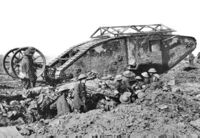
After Bethesda got the rights to make Fallout 3, they were like "Guys, guys, let's make a SHITTY POWER ARMOR!" and they went through with it. The result was far from shitty a mixed bag. Sure, it has -2 AGL, less radiation resistance, and makes you move around like the Comic Book Guy from The Simpsons, but it looks BAD-ASS!!! Noted for using Microfusion packs and batteries to power the suit like an RC car, which make recharging quick but run out of power often. As of Fallout 76, we have what could be considered a more canon representation than Fallout 4's. T-45 has the most common spawns of all the military armors and the lowest base spawn level. When compared to an at-level suit, it has worse protection than any military suit, but is lighter with a much cheaper price tag on builds and repairs.
NCR Salvaged Powered Armour

This is the 'zombie' version of the T-45d. After the Battle of HELIOS One, the NCR recovered many suits of T-45d from fallen Brotherhood Paladins. However, either because the NCR do not have the capability to manufacture spare parts, lack the actual knowledge to use and maintain power armor, or a bit of both, the "power" part of the armor was stripped, so its just...armor.
The servomotors that augments the wearers' strength have been removed along with a good chunk of the extra plating, and the back-mounted rad scrubbers were replaced with a cheap air conditioner so the wearer doesn't die from heat stroke while using it (and lords help you if you're patrolling in the middle of the desert with heavy metal plates all over your body). As its not "true" power armor, it does not require special training, nor is it vulnerable to electric-based attacks, so just about any mook with some measure of brawn can be fitted into it and send him off. The result is, for a lack of a better term, plate armor with an AC strapped to the back. It has less protective qualities than the armor it's based on, has no built-in rad protection, and has no mechanical assistance to carry all this weight since it was ripped out, so its cumbersome as all hell.
Its use is less for practicality and more as a moral and political tool, basically letting the NCR brag "See? We got power armored troops too!" without actually having the knowledge and technology to build and maintain said troops, which goes with the central theme of Fallout: people of the future attempting to recreate the past, without having a firm grip on what it actually is.
Crunch-wise....what you see is what you get. It has a -2 AGI penalty with no +2 STR bonus to offset the 40kg weight of the armor, or rad protection to help you wade through heavily irradiated areas, with some pretty alright DT if you have the full set. Due to the infinitely better late-game options for personal protection (either just as good with less penalties or full-on upgrades), the salvaged armor only becomes useful if:
A. You want to cosplay in power armor, without wanting to bother getting the perk to actually use it (as there are only two ways to get them, both of which are difficult and late in the game).
B. In need of scrap material to repair actual suits of power armor with.
C. You're really desperate for high-DT armor.
T-51 Powered Armor

The second generation of power armor, the T-51 series managed to get all the kinks ironed out. Used to kick the Chinese out of Alaska and invade China. The quintessential Fallout power armor suit. The T-51b variant is common among the West Coast Brotherhood of Steel. Two suits are known to be in the Capital Wasteland.
This armor only has +1 STR for some reason. What's even stranger is that the hunk of metal that you put on your head (AKA the helmet, but who calls it that?) gives you a +1 CHR bonus (probably because it's heavily featured in old world propaganda, but yet again, so was the T-45d variant). We really should be wearing around hunks of metal on our heads these days. After all, this armor be pullin' all dem bitches...
T-51b is the most advanced power armor that existed in the world before the Great War. Some confusion came with the introduction of the T-60 by Bethesda, who never bothered to tell anyone that this new armor was for the rank and file soldier while the T-51b was used by veteran squads. For the record, yes it is still the best and no the T-60 did not replace it.
Used as the standard armor for Paladins, the suit has become an icon (both in universe and real life) for the Brotherhood of Steel.
Due to a developer error that Bethesda never bothered patching, the Winterized variant that you receive as a reward for completing Fallout 3's Operation: Anchorage DLC is actually the version meant to be worn by NPCs in the Anchorage simulation, so it's functionally indestructible, with a whopping 999,100 HP (the version you were meant to get has only 100). However, the vanilla game's suit was involved in a rather difficult fetch quest (where you were hired to retrieve it for a ghoul called Crowley), and the NPC version of the winterized armour still has that version's quest script assigned to it, so taking it will prematurely mark that quest as completed by making the game think you stole the vanilla suit for yourself, locking you out forever. However, anyone in their right mind would have stolen the suit instead of giving it to Crowley anyway, it's not all bad.
X-01 Power Armor
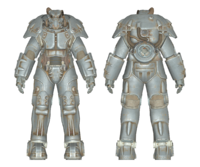
Developed as a prototype before the war, the X-01 was later improved drastically by the Enclave into the technologically sophisticated Advanced Power Armor. Crunch-wise, both versions are the same, though fluff-wise, the latter is MUCH better then the former, even if they both look identical. Standard issue for the Enclave (at the peak of their power) the Advanced variety of the X-01 to this day still outclasses all other power armor by a wide margin, utilizing secret underground engineering centres and factories to use the most advanced materials for construction. These things were BAD ASS, with the Enclave eventually losing the war thanks to:
A: The player blowing up all that shit used to make them.
B: NCR using zerg tactics.
Sadly (for the Enclave), these aren't produced anymore thanks to losses in manpower and resources during the Enclave War, forcing the Enclave to develop and produce shittier armors instead. A neat little trick these armor had was an optional addition of tesla coils. In-game this is just better armor, in universe it uses small zaps of electrictiy to hit incoming projectiles melting bullets and detonating explosives before they can deliver their payload directly into the target.
Just remember the difference between the Prototype and Advanced versions. The former tends to have more balanced stats (4, 76) while the later tends to be OP (Fallout 2, New Vegas).
X-02 Power Armor

Developed by the Enclave Department of the Army after the Enclave's loss of the Oil Rig back in FO2. Produced in their base in Raven Rock, the X-02 was supposed to be a step-up from the previous X-01 series, utilizing lighter-weight ceramic plates that granted better mobility without compromising defense, a segmented armor pattern to better absorb damage, removal of the hump and replacing it with more traditional armored pauldrons, and a redesigned helmet that provides a more menacing but reduced head profile. They were apparently produced in enough numbers that the Enclave managed to phase out the older X-01 suits for these. Due to the black coloration and sinister helmet design, Brotherhood soldiers dubbed it the "Black Devil" power armor.
Crunchwise....well, it sucks. Atleast in FO3. It’s barely an upgrade over the T-45 armor (you know, the first armor the US ever fielded back in the Great War) and is completely inferior to the Brotherhood's T-51b armors, despite it being hundreds of years old.
It returns in FO4 as Creation Club content, where it now gets better representation as having the same stats as the X-01 suit (which is already a clear-cut upgrade over the more common T-51 and T-60 suits), but better energy weapon resistance.
X-03 Power Armor

Also known as Hellfire, the armor was produced near the end of the Enclave-Brotherhood war on the East coast. Basically an attempt to use more recent discoveries in robotics of all things, the armor is remarkably tough for something that costs only slightly more resources than the X-02, boasting a huge increase in heat resistance as befitting its name. Originally used by flame troopers, it has since become standard issue for the Enclave. As far as power armor goes it's above average. It's only issue is the heat resistance seems to mess around with the tesla coil systems no longer giving it the option without extensive modifications.
The armor becomes usable in FO4, and much like all Enclave-issue armors, is one of the best armors in the game in terms of pure protection stats.
T-60 Power Armor
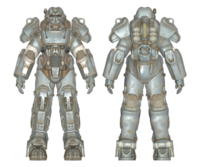
A new addition to the series in Fallout 4, introduced as the other “best” Power Armor. The T-60c was designed to supplement the T-51. With a more canonical stat base in Fallout 76, it has inferior protection levels to the T-51b. However, it is much cheaper to build and repair, making it better suited to mass production and deployment. This frees up the superior T-51 for deployment in elite units, which also explains the T-51's prominence among the Brotherhood of Steel until they set up for mass deployment in Fallout 4. It draws many of its design elements from the T-45, as that allows it to use many of the same internal components as the earlier models. The double pauldrons look is still silly.
Horned Power Armor
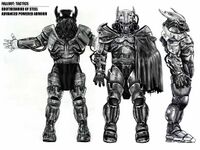
Used in the semi-canonical (due to Fallout 3, New Vegas, and Fallout 4) Fallout Tactics (Bethesda's offical stance is that the major events are canon, but many fans choose to believe the whole thing is canon) the Horned Power Armor is used by the Midwestern Brotherhood of Steel with it's defining feature being, you guessed it, horns. The Midwestern Brotherhood stands out as fully incorporating itself into wasteland life, offering protection to tribes and towns in return for resources, recruits, and information. This in turn is shown in the design of the armor, being the only suit designed from scratch by a Brotherhood faction since the war. Designed for mass production over protection (similar to the more recent Enclave designs), the armor still incorporates many mechanical elements from the T-51b such as an internal reactor. It's also slimmer and less bulky than other armor designs (though not on the same level of the newer Enclave designs).
Overall, the armor is a compromise between mass production and protection, with heavy modification possible due to the more scrappy way it is produced unlike the more industrial Enclave. While it is numerous enough to equip all of their Paladins (keeping in mind their numbers are MUCH larger then other chapters), it still leaves more of the lower ranking infantry to use more traditional protection.
The armour's horned helmet, greaves, and slimmer design are reminiscent of the Enclave's Mk. II advanced power armour (or X-02), which may imply that they're connected. One of the complaints about the original Tactics armour design was that it didn't look retro enough for Fallout, so it's possible that it's actually scavenged or stolen Enclave armour (which wouldn't be a stretch, since the Enclave are also known to have been active in Chicago), and the design was just "retrofied" for its reappearance in Fallout 3. Alternatively, it's possible that the X-02 was made by hybridising elements of this armour with the earlier Enclave X-01. Bethesda haven't said anything about the similarity though, possibly due to Tactics' weird place in Fallout canon.
Raider Power Armor

Raiders in the Commonwealth and beyond have managed to refurbish power armor frames, and by cobbling together scraps of T-45 and T-51 armored suits and scrap parts, this.....thing, was made. Raider power armor is the least versatile & weakest of all the armor types. It's complete shit against anything that has a caliber above .38 and laser pistols can kill the user within 4-5 shots. Turns out a bunch of drugged-out vindictive assholes who shun society are not the best engineers. Still looks metal as hell though, and it is still better than even the best non powered armor while being cheap as hell to repair.
Despite how it looks, however, it is functioning power armor. It’s not very good power armor, but it’s power armor. It’s fully sealed, so it has some measure of environmental protection, the servos work to an extent, and it meshes in standard power armor frames. Yes, this means that a couple of crack-addled junkies are capable of making and maintaining functioning suits of power armor, but a large nation state with an established technology base can't..
Gallery
-
The first five Marks through the ages.
-
Diagram of Aquila armour components.
-
Eternal Crusade concept art. Again, fitting real snugly.
-
It actually fits! Still a bit unsure about those hips though.
-
Japan's take on the Marauder Suit.
-
A Clan Ghost Bear Elemental armor alongside an Elemental out of armor as well as a Kuritan Kishi and DCMS infantry soldier.
See Also
- For the 40kekkers in the room, an official animation of how Space Marines put their armour on.




